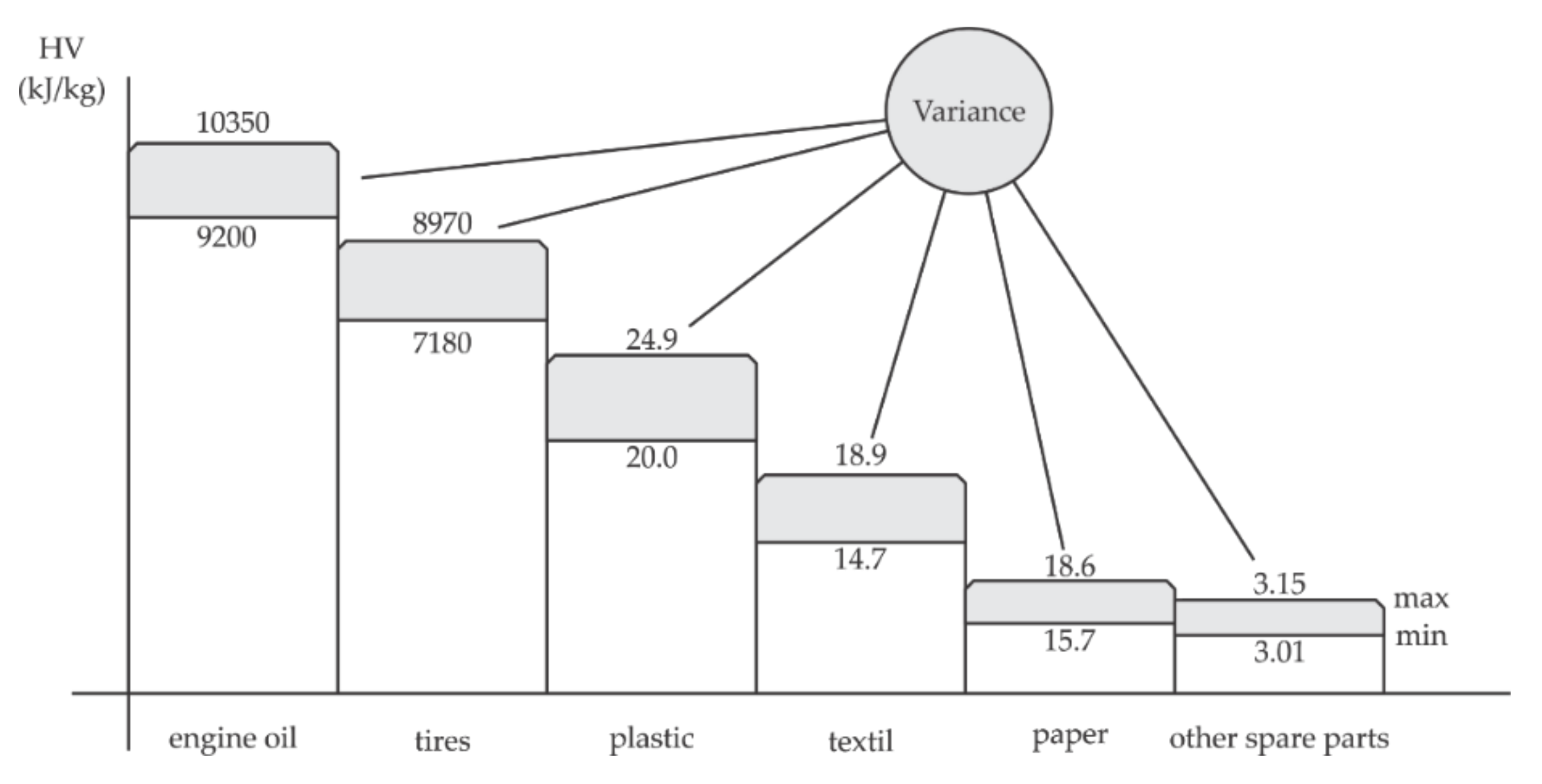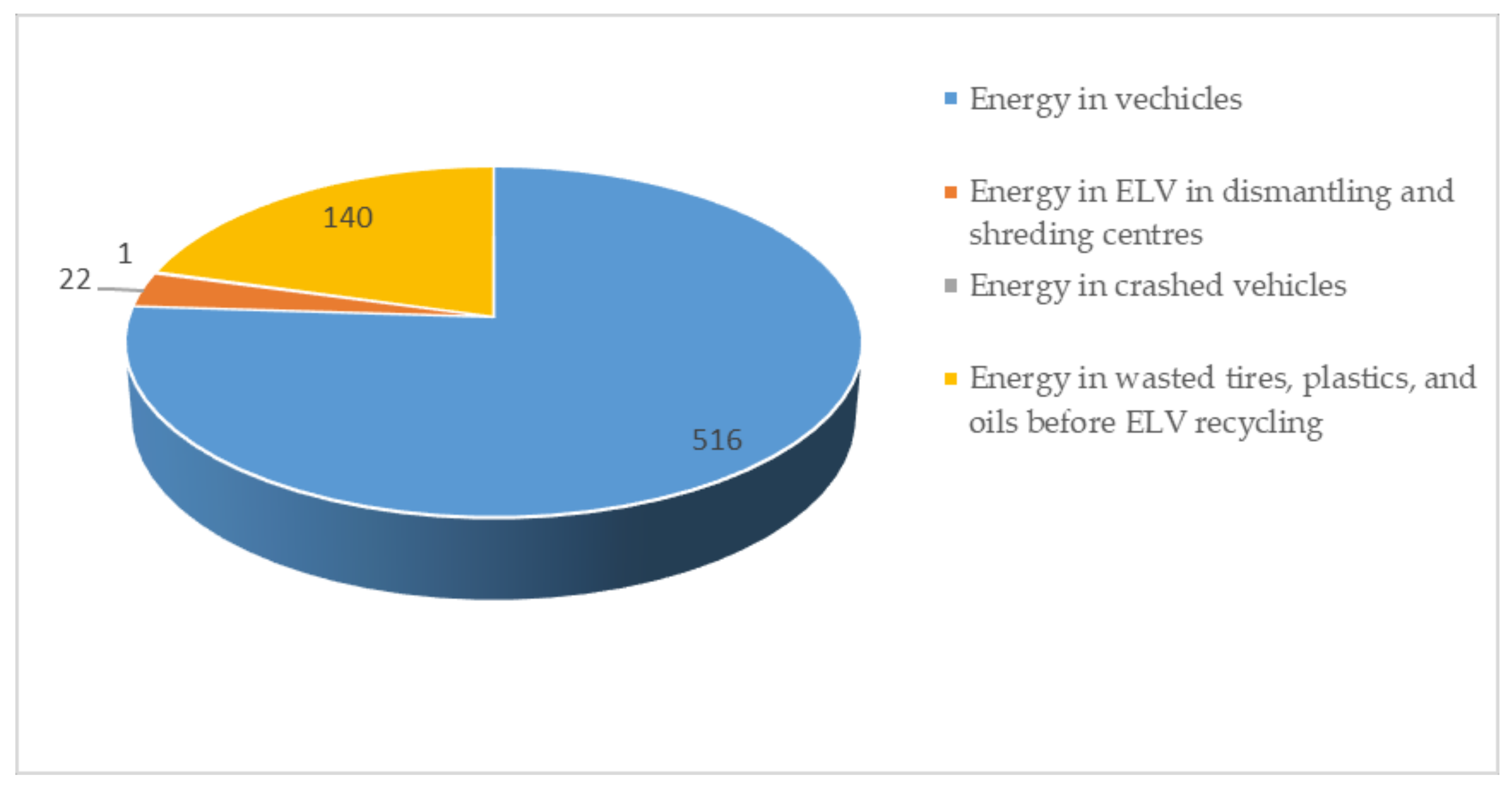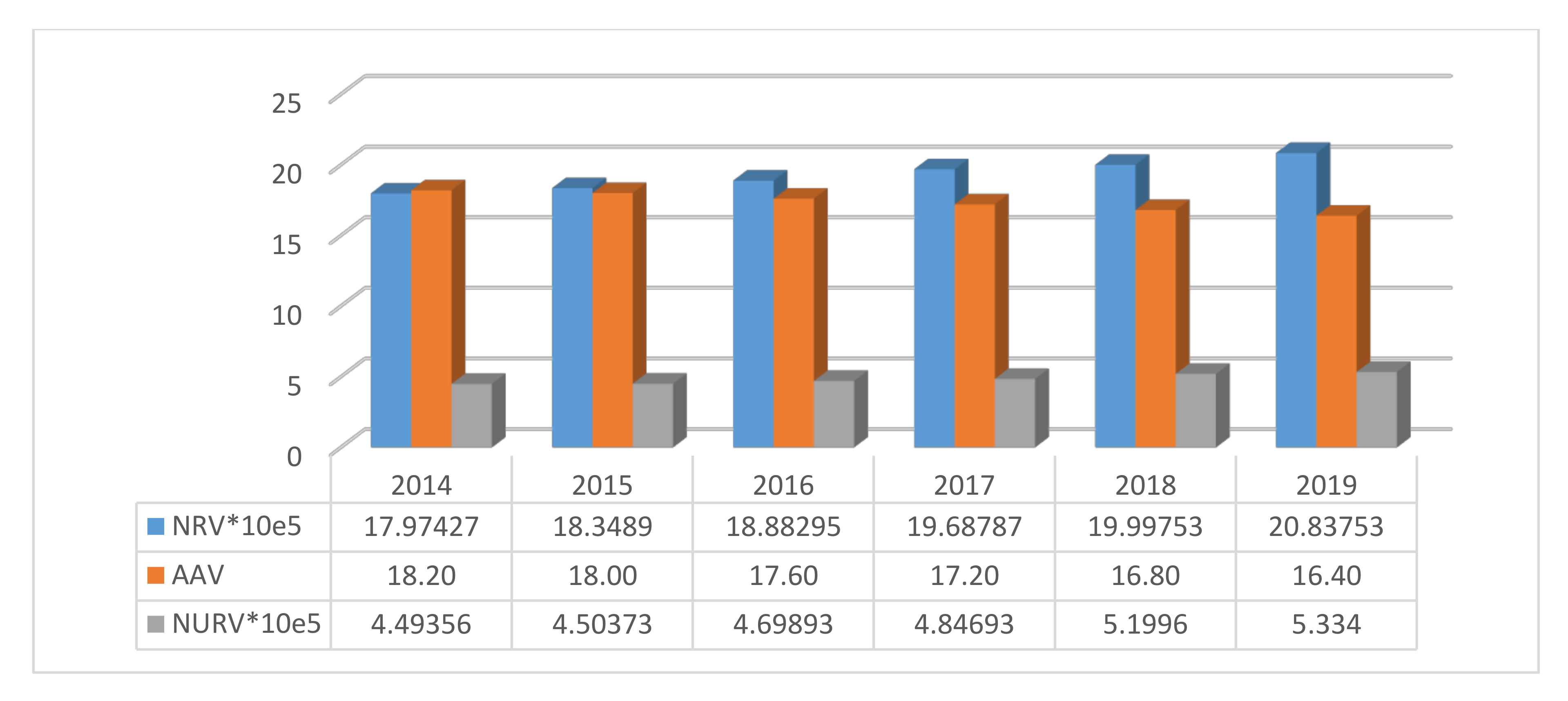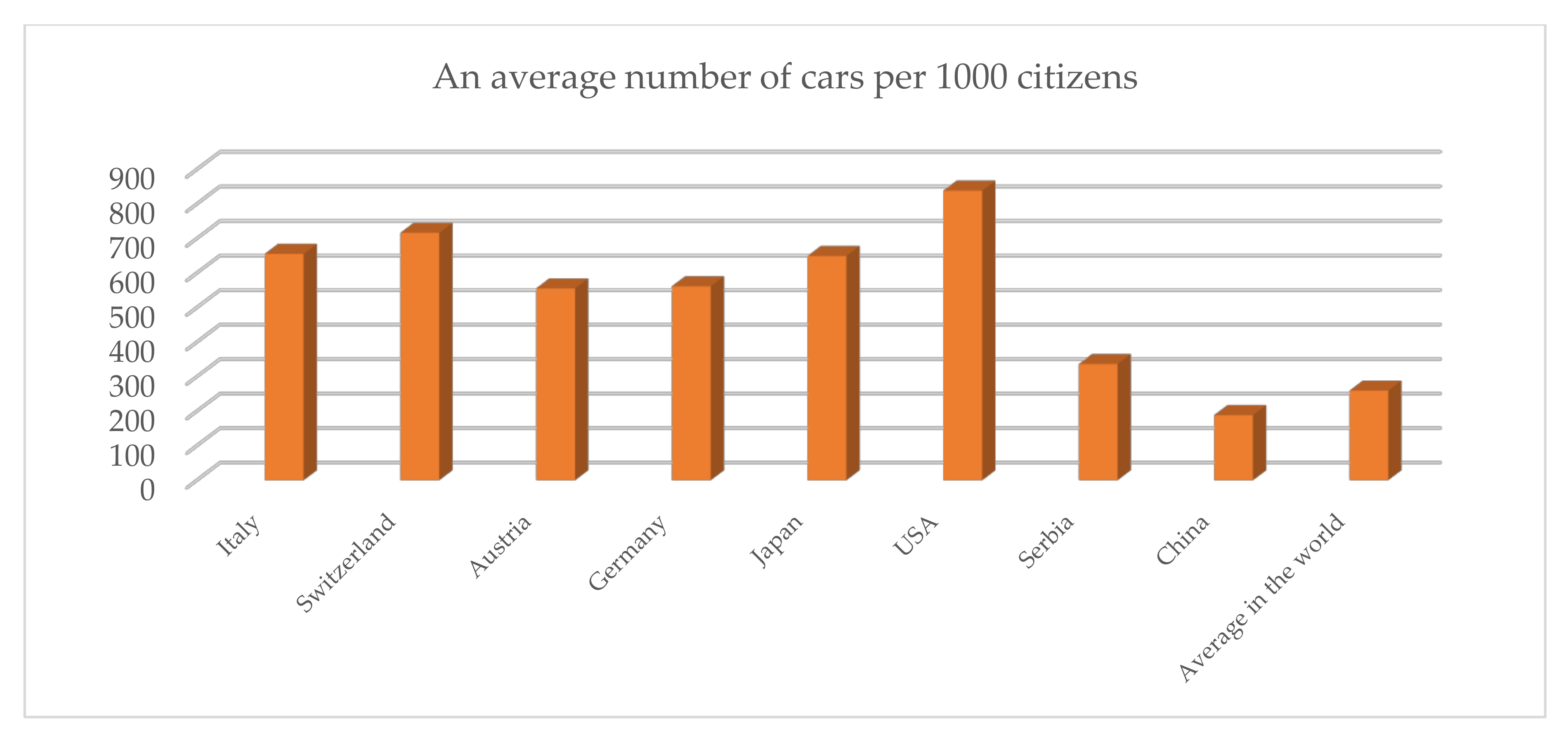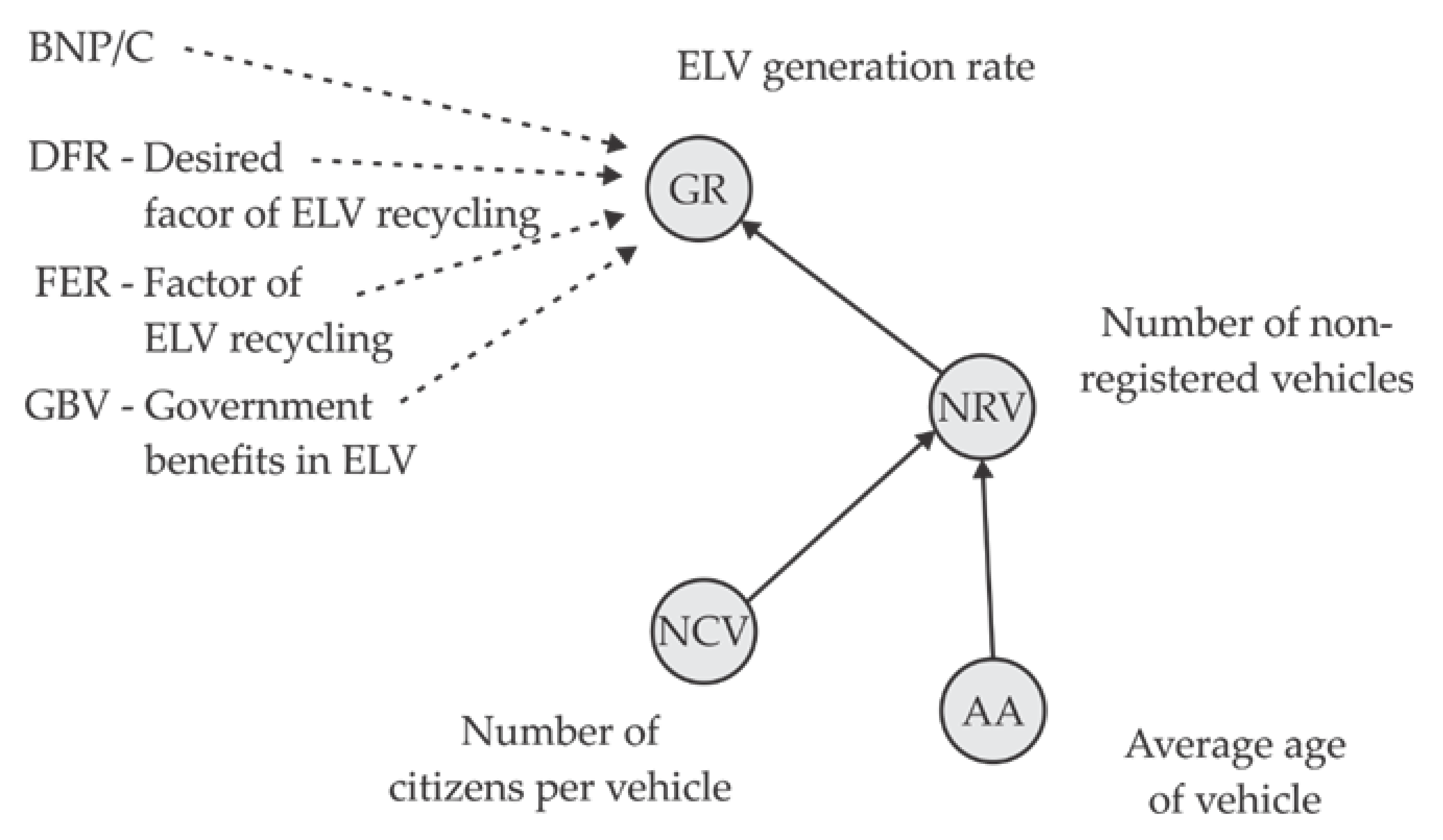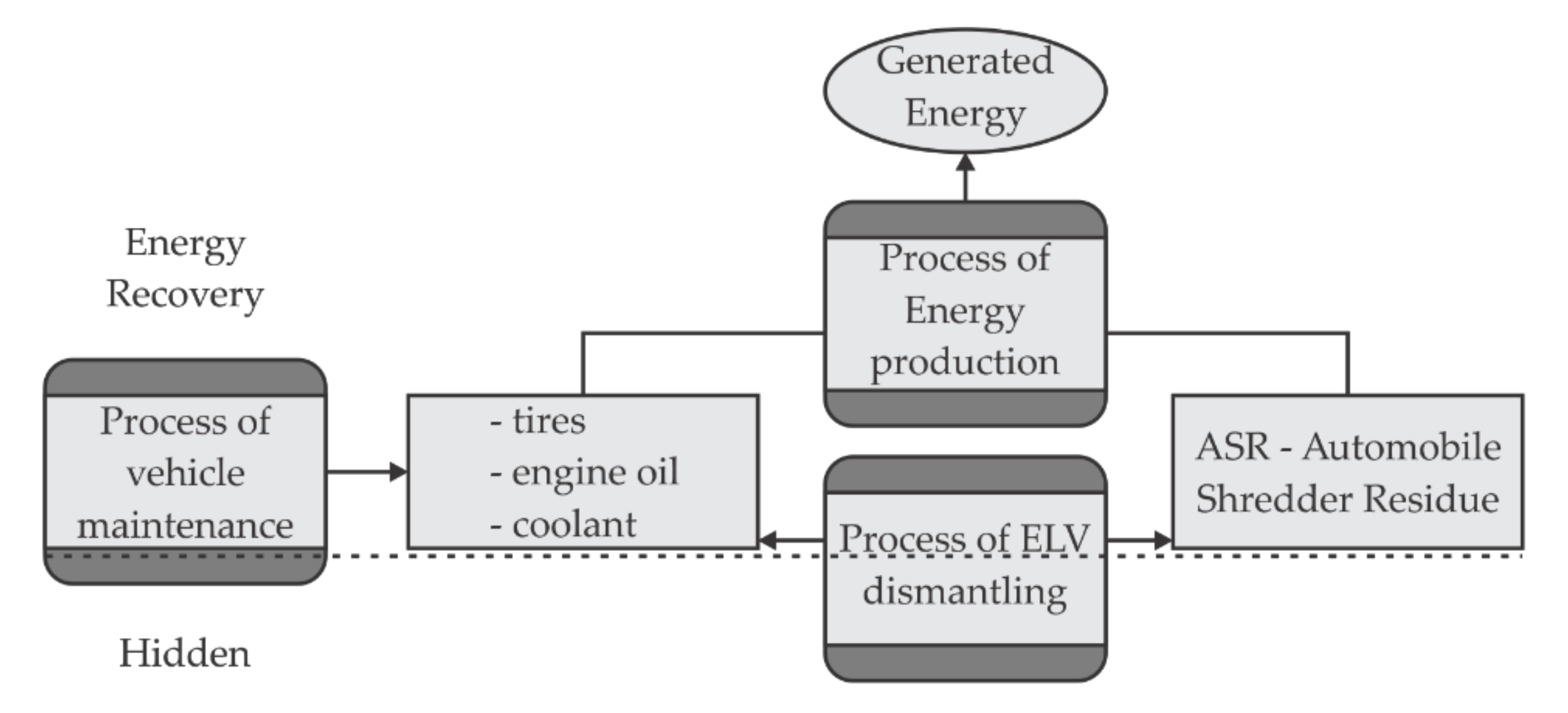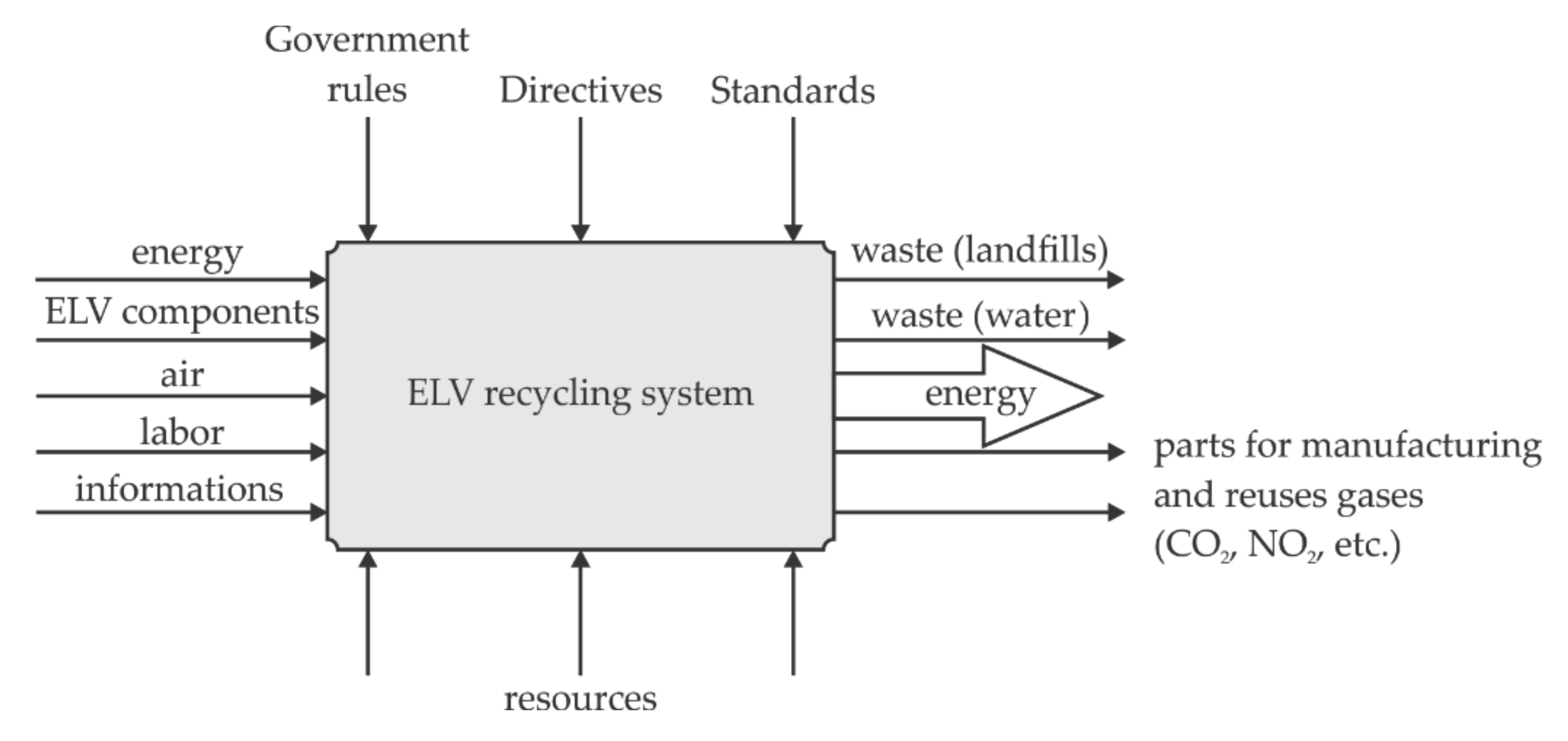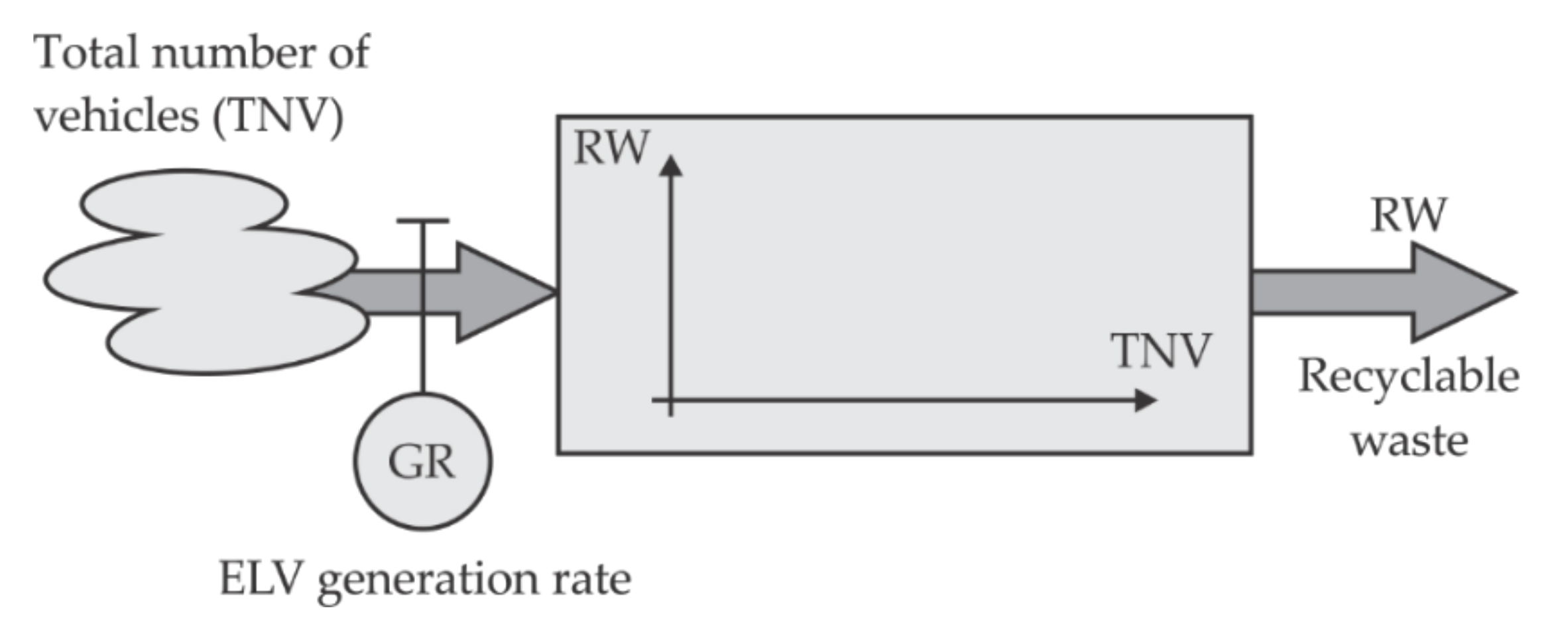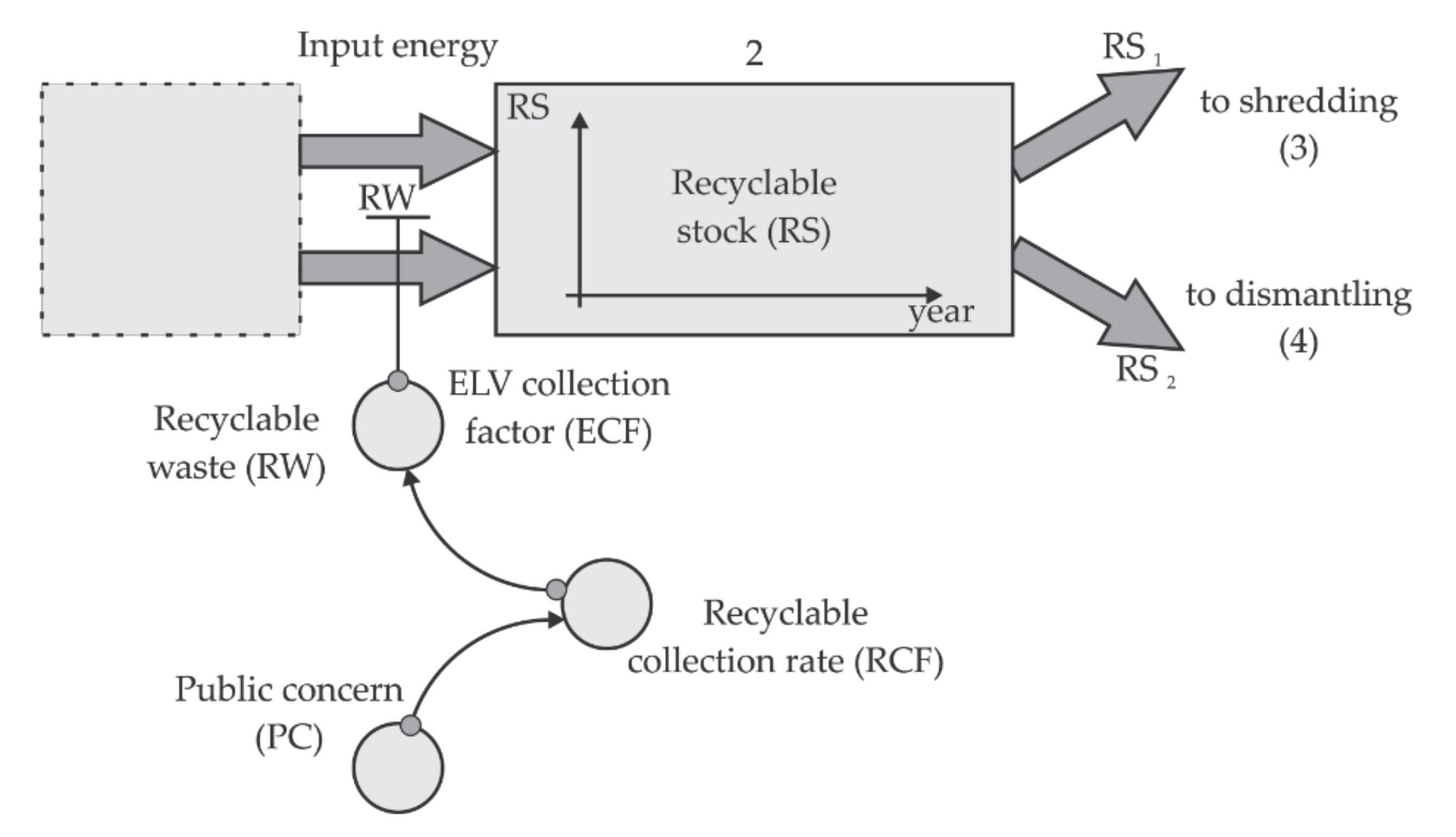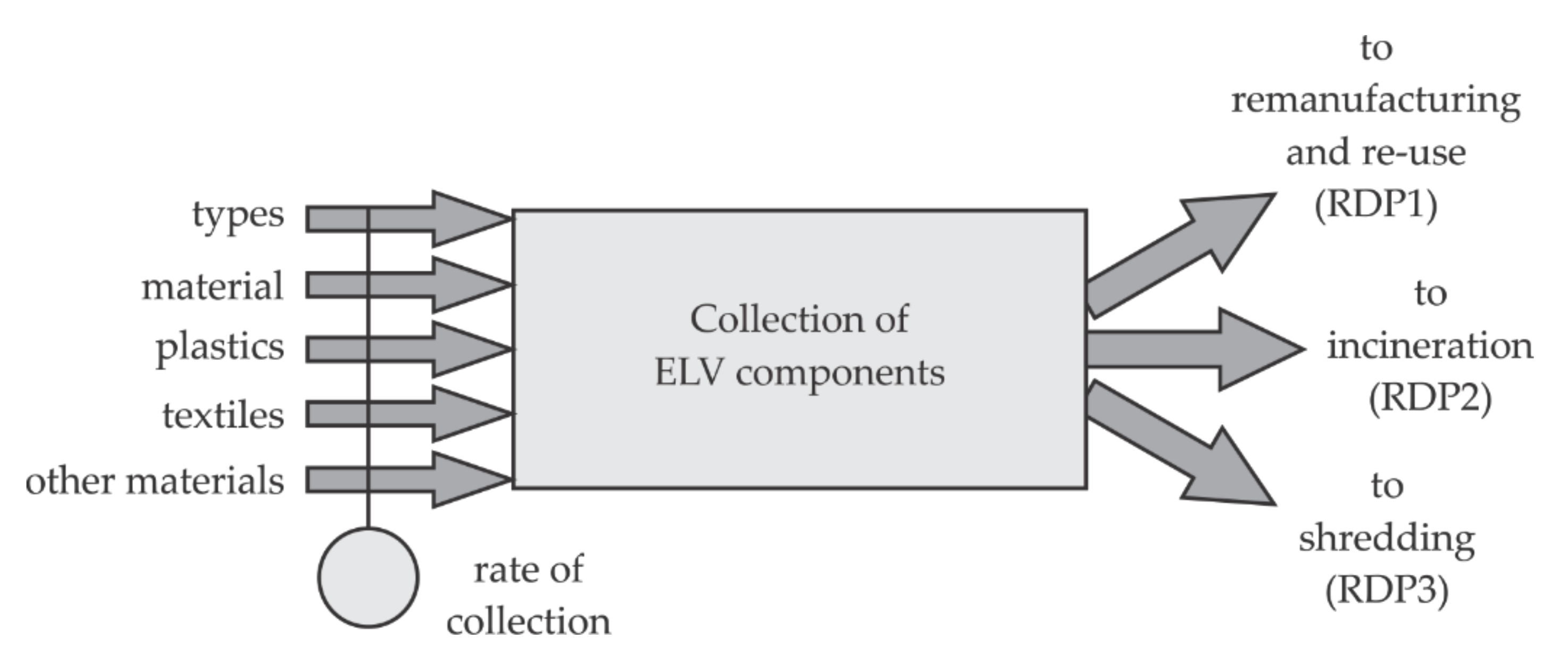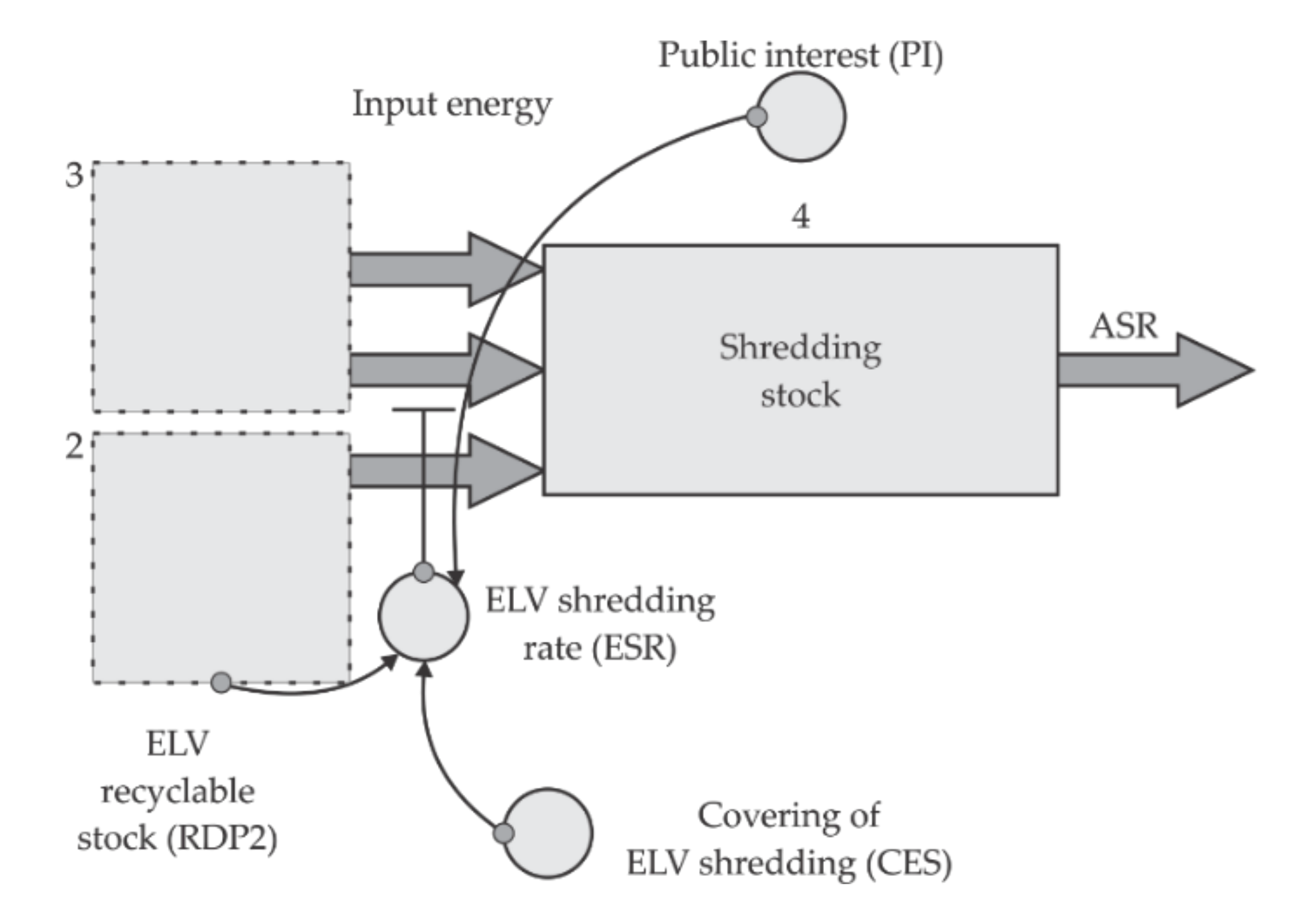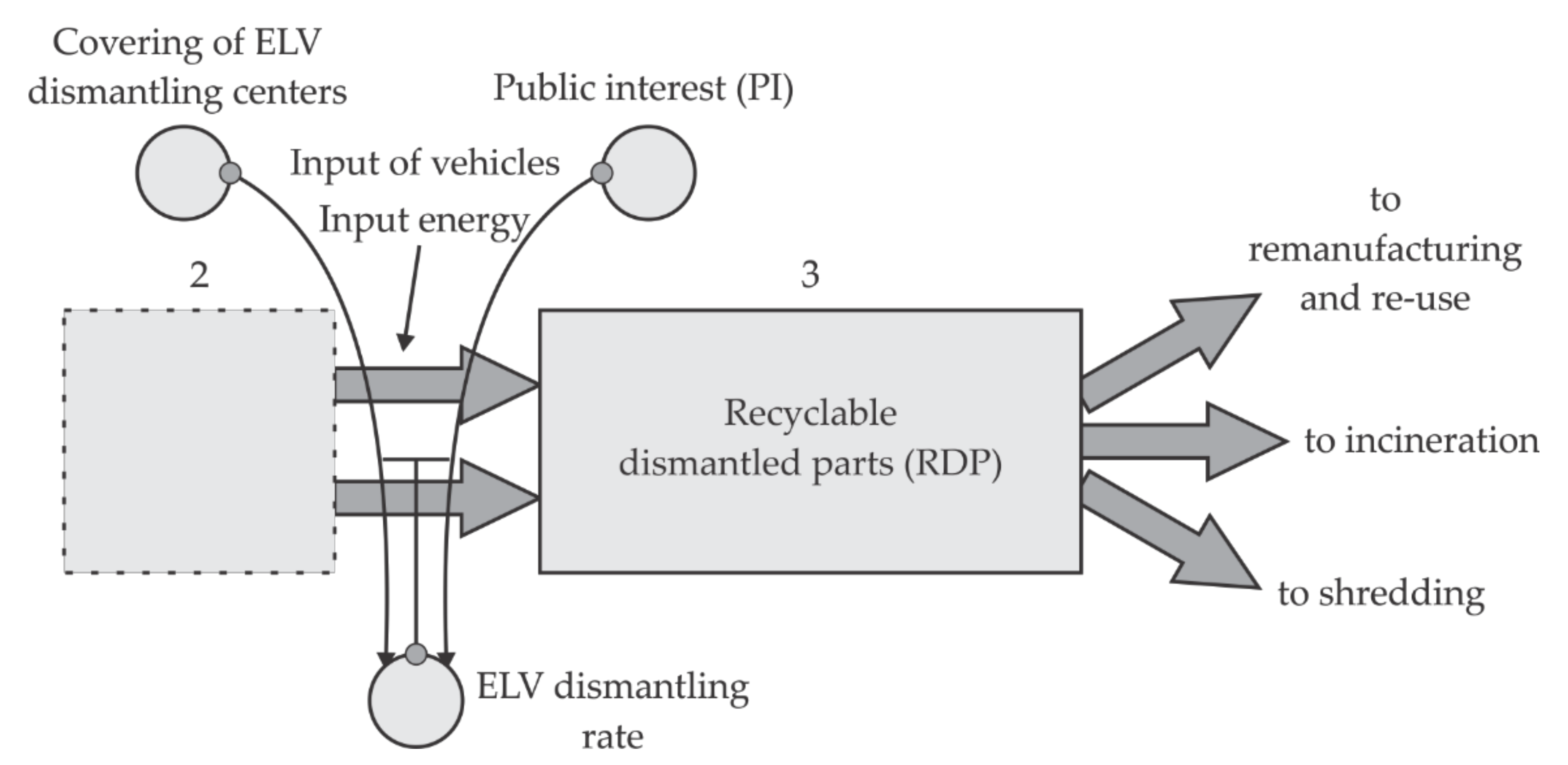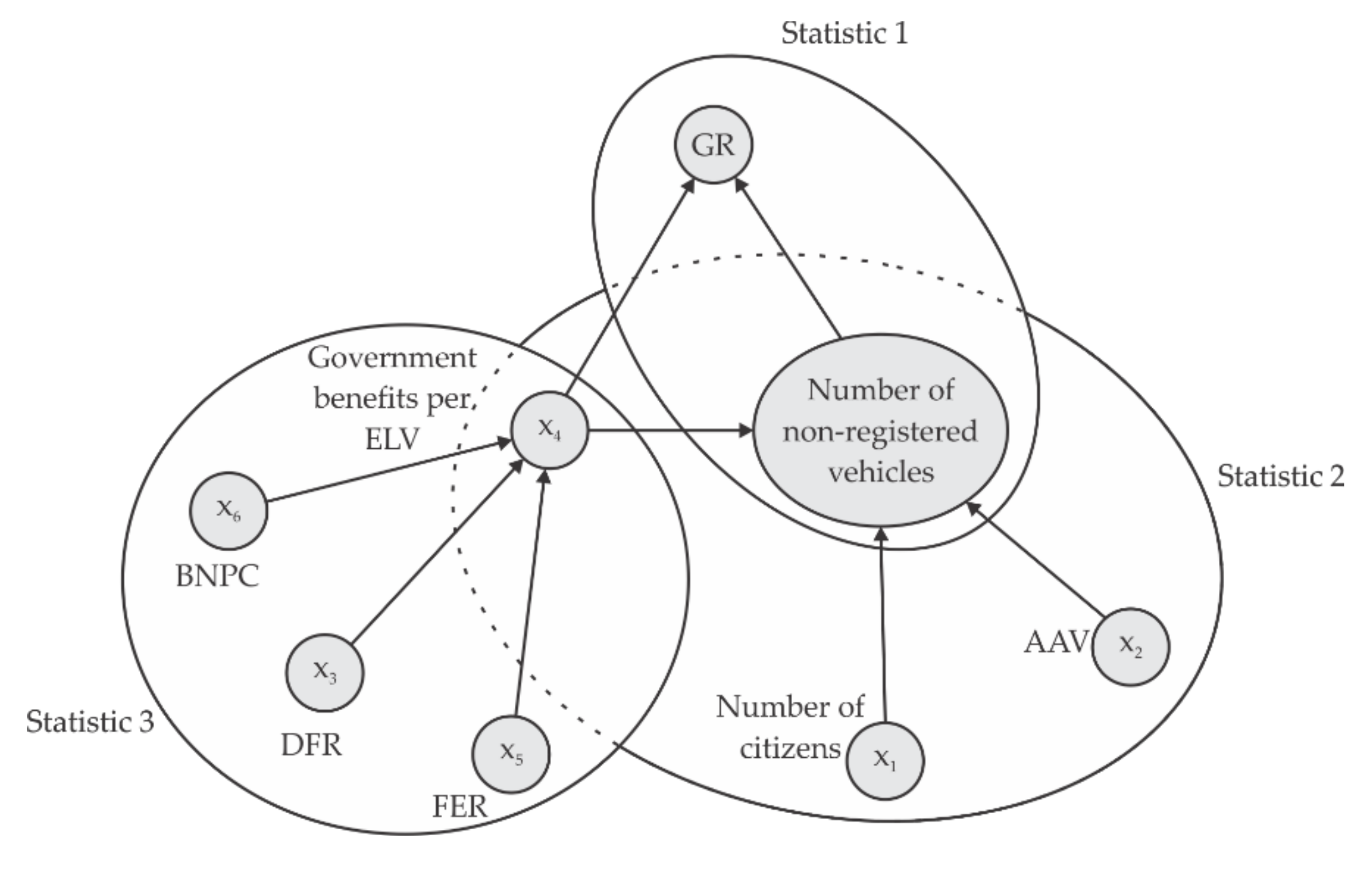Abstract
End-of-life vehicle (ELV) recycling is a process that spends energy and could be an energy source as well. This part of energy recovering depends on many different factors related to the broad and local aspects of ELV recycling. The ELV recycling process is consuming energy from different energy sources (electrical, fossil), however, this consumption is lower in relation to energy consumption during the production of new vehicle parts from the very beginning. This article attempts to promote an integrated approach in the analysis of the problem of energy recovery through ELV recycling. Authors aim to analyze the ELV recycling process as an energy generator and to present possibilities for its energy recovery. The research analyses are based on the empirical investigation of ELV recycling in the Republic of Serbia, as a developing country, and on defined statistical model presenting the impact of ELV recycling on energy generation, spending, and conservation during one-year intervals. Research results showed that the higher ELV generation rates may led to a higher energy recovery, and environmental and socio-economic sustainability.
1. Introduction
Some of the burning issues of modern industrialization are related to energy recovery and environmental pollution. Limitation of fossil fuels could be partly overcome by sources of renewable energy, waste management, and overall environmental pollution reduction [1]. When referring to renewable energy it is often referred to “classical” renewable energy sources such as: solar energy, wind power, waterpower, etc. However, in everyday life, a number of products have been consumed with the potential to be used as renewable energy source or energy recovery. In each form (paper, plastic, rubber, communal waste) there is a component with high energy potential and through the recycling process they could be used as a source of “renewable energy.” Recently, waste (non-desired output of each process), as well as waste management, has been considered as a valuable source of renewable energy [2].
The automotive industry is a very propulsive sector, since the total number of registered vehicles in European countries has grown by 5.5% in the period from 2012 to 2018 [3]. The number of vehicles, number of jobs, gross income, etc., reflect their influence on the quality of life (QoL). Besides its positive impact, this sector has many negative impacts. One of them is connected with a higher rate of energy spend for vehicle production [4,5,6]. Besides that, each input part or material for a vehicle is also produced with an appropriate amount of energy [7,8]. Thus, production depends on the type of produced parts, level of technologies, local and global business environment [9,10], etc.
End-of-life vehicles (ELVs) are a problem which cannot be resolved through simple disposal, since it is considered as hazardous with a potential for polluting the environment [11], and as a spatial problem that is generating around 5% of industrial waste across the world [12]. Now more than ever, in contemporary industry, important prerequisites for the development of an efficient ELV recycling model as a reverse supply chain are to be in line with environmental requirements and long-term sustainability goals [13]. Although the process of developing an ELV reverse sustainable supply chain management system is complex, delicate, and time-consuming, it can lead to environmentally friendly solutions and may ensure the repeatability of ongoing ELV recycling processes [14]. Accordingly, the most undesirable procedure of ELVs is disposal and landfilling, with ELVs recognized as an environmental problem. Accordingly, the more favored procedure includes energy recovery, recycling, and reuse of ELV parts. With this in mind, frequently adopted approaches to solve this important issue include reverse logistic, flow analysis, benefit costs analysis (BCA), sustainability analysis, and modelling and simulation [15,16,17,18,19]. It is assumed that the number of ELVs per year by 2020 has increased approximately up to 80 million units, thus demanding strong motivation for fast growing waste flow management [20,21,22,23]. ELV waste processing is difficult due to the complex structure and varied composition [24]. Therefore, in the developed recycling strategies, recycling rate and other indicators related to higher sustainability were proposed [2,25,26].
The important fact is that the European Union (EU) recognized this problem and in the last two decades developed the Directive on End-of-Life Vehicles 2000/53/EC and supporting European Norms (EN) and International Organization for Standardization (ISO) standards [22,27,28]. This could lead to higher ELV recycling business connected with higher energy consumption, waste and environmental pollution reduction, employment rate, development, and implementation of new recycling technologies. Besides that, the outcome of this process would cover lower environmental impact, lower price of recycling parts and materials, with extensive growth of ELV industry.
The article aims to analyze the ELV recycling process as an energy generator and to calculate its energy recovery. The objective is to encompass and discover faster ELV recycling processes through identification of energy related indicators. To achieve these objectives, authors introduced a modelling and simulation approach. The developed model consists of five sub-models: (a) Recyclable waste, (b) recyclable stock, (c) shredding, (d) stock of dismantling parts, and (e) incineration. Input data for simulation are obtained through empirical study and literature review [1,29]. Simulation results indicate possibility for high energy recovery by ELV recycling process, as a sustainable solution for the further process of ELV recycling and other production processes.
The purpose of this paper is pointing out the possibilities of obtaining energy from ELVs and quantifying the impact of the observed factors on the amount of energy recovery in developing countries.
The scope of this paper is to comprehend the current state of ELVs in the Republic of Serbia with limitations regarding the use of ELVs and their recycling, the applied methods for modelling, and analysis of energy potential from ELVs.
The methodology approach is established on system approach material flow analysis for problem description and analysis, system modelling using business dynamics approach, and technologies and tools for input data generation, as questionnaires and data mining. The methodology contains four main steps. In the first step, the basic ELV system of the ELV recycling process was defined by applying material flow analysis (MFA). In the second step, the main sub-model of ELV recycling process was defined. In the third step, the Delphi method was utilized to determine the values of the variables established for the models defined within the second step. The fourth step is to determine the statistical relationships between the ELV generation rate and observed influencing variables.
The findings are theoretical and empirical. Theoretical findings are related to ELV energy recovering system model development. Empirical findings are: (1) definition of input data in the condition of uncertainties and constraints of data generation and evaluation; (2) determination of possible energy recovery; and (3) present energy recovery from ELV recycling process in Serbia.
The originality of the presented research has been related to the developed model of energy recovery direct from ELV recycling process. The importance of the proposed model, next to the theoretical facts, is the practical application providing an opportunity to recover with a relatively high amount of energy from the ELV recycling process and the opportunity for the faster treating, as a kind of renewable energy generation.
The article is structured as follows. Section 2 concerns the ELV recycling process and Section 3 provides a model of actual energy generation and converging in ELV recycling process, with complementary empirical and literature research. Section 4 presents discussion on the results of research and statistics related to ELV energy recovery in Serbia and worldwide. In Section 5 concluding remarks are presented.
2. End-of-Life Vehicle (ELV) Recycling Theoretical Background
Coming as a strategic and a tactical issue for companies and government bodies to deal with, there are a significant number of research sources focusing on the material analyses, recycling planning, energy recovering, and waste management and pollution reduction.
End-of-life vehicles (ELVs) have, in the first phase, been considered as an environmental problem, which must be solved through many decision-making approaches, directives, and standards [30]. Consequently, ELV recycling is a thoroughly researched issue related to different aspects, such as volume [31,32], dismantling technologies and disassemblability [33,34,35,36], emission-control and decomposition [37,38], impact of hybrid and electric vehicles [39,40], recycling technologies [4,41,42,43,44], socio-economic benefits [45,46,47,48,49], development of financial policies [50], plastics recycling [51,52], impact on quality and environment [53,54,55,56], information technologies application [57,58], sustainability [59], reverse logistics [29], legislative boundaries and environmental performance [60], and infrastructure [61,62]. Other research sources present methods and business potential for components re-use [63], definition of treatment centers for ELV processing [64], presentation of evaluation economics and material destinations remanufacturing optimization model according to a ELV legislation [65], passenger vehicles aluminum parts recycling [66], development of ELV costing frameworks [58], application of Preference Ranking Organization METHod for Enrichment Evaluation (PROMETHEE) method to select the best ELV management method [67], and Analytic Hierarchy Process (AHP) method for selection of equipment for detoxification of ELVs [68].
Some authors suggested simulation approaches (Berzi et al. [69]) and dynamic modeling [70] to present influence of different parameters on recycling rate, energy recovery, and recycling infrastructure, and nonlinear optimization model [71] to illustrate the relationship between particle size reduction and liberation during the shredding and recycling of ELVs. Shmidt et al. [72] focused on identification of the environmental impacts and relevance for combinations of recovery/recycling and lightweight vehicle design options through the whole life cycle. Mazzanti and Zoboli [17] introduced the possibilities for specific economic instruments influencing the producer responsibility principle in waste and recycling policy. Smith and Keoleian [73] introduced the energy usage reduction and pollution prevention in the USA through remanufacturing a medium-sized gasoline automotive engine. There are suggestions discussing that recycling technology innovation could be a significant driver for technology shift in automotive industry [74]. Mixed integer linear programming (MILP) model for ELV recovery network design constituted from dismantling centers and processing facilities has been introduced by Qi and Hongcheng [75]. Furthermore, mixed integer nonlinear programming (MINP) has been suggested for optimal long-term planning in the EU and in the Republic of Serbia vehicle recycling facilities by Simic and Dimitrijevic [76,77]. Literature shows the application of regression analysis to estimate the global flow of base metals (iron, aluminum, copper, lead, and zinc) in the used automobile trade [78]; prediction to determine the impact that pre-shredder treatment could have on achieving 85% recyclability rate in 2015 [79]; and to elaborate end-of-life product specific material flow analysis [80]. Current technologies within the Industry 4.0 concept allowed the development of smart dismantling monitoring and smart trolley system for an ELV recycling centers [81]. A literature review showed that previous research dealing with the recycling process, mainly solves various problems of a local character. Consequently, it is suggested that a definitive solution, and accordingly, additional comprehensive research is needed [24].
Additionally, the materials used in the production of vehicles are constantly changing. Therefore, the individual types of ELV waste components are further considered, since the impact on the environment and energy recovery from components, such as oil, tires, plastics, and glass, are significant. Waste oils and hazardous liquids from ELVs are the components that are isolated first [82]. In the recycling process, the tank is dismantled, so that the oil is separated through the equipment for extraction and purification and further used as a consumable resource (after removing excess water and filtering the particles) in the heavy industrial plants and power plants. Stricter emission controls can limit this, so a better option is to use refined oil as a lubricant, although this is not currently widely practiced. Oil filters can retain large amounts of waste oil that can be reused using special filter presses before recycling. The larger issues are related to the antifreeze and motor fuel, which after purification require subsequent chemical treatment, which was confirmed by research on the application of LCA for conditions in the Republic of Serbia. The car is not disassembled further before these processes are finished [83].
When considering the total amount of plastic waste, ELVs participate with a share of 5%. The main challenge for successful polymer recycling is their diversity and the complicated and time-consuming processes of their collection and sorting. Globally, it can be estimated that the amount of plastic waste in the world reaches approximately 250 Mt per year. This was estimated through the amount of plastic produced worth 265 Mt in Europe in 2010. With this estimated number, taking into account the longer lifespan of ELVs in the world compared to Europe, which results in less waste plastic per car, waste cars generate plastic waste in the amount of about 10 million tons per year. These amounts of plastic waste in the world can have a great negative impact on the environment and society.
Plastic treatment, including ELV plastics, can be performed in four ways: Reuse, material recovery, energy recovery, and landfilling. Material recovery involves mechanical recycling, chemical recycling, and biological or organic recycling, while energy recovery involves the use of plastic waste as a substitute for fossil fuels to produce heat, steam, or electricity. The main difference between recycling technologies is the change in material structure. Mechanical recycling does not change the structure, while chemical recycling does. In addition to mechanical recycling, chemical, and raw material recycling technologies, there are various solutions for plastic waste treatment, such as dissolution, solvolysis, pyrolysis, gasification, etc., while energy recovery from plastic waste is most often performed at power plants or waste incineration plants. The ecological sustainability of different material recovery technologies is determined by the input material. For instance, blast furnaces that can use heterogeneous waste plastic, as raw material found in ELVs scrap, may be more suitable than mechanical recycling process [84].
Two types of glass are used in cars—reinforced and laminated. Tempered glass is easy to remove from a vehicle when it breaks. Laminated glass does not break, so it needs to be removed manually, which requires a lot of time and resources. The ease of removing the glass in the disassembly phase depends on the way the glass is sealed during production. The use of rubber seals makes the process of removing glass much easier compared to the method of direct gluing. In the case of rubber seals, the complete window can be removed, but the more commonly used procedure of direct bonding with glue involves cutting the glass disk in as large a diameter as possible, leaving a significant part of the glass in one piece. In European countries, part of the waste glass of vehicles is currently recycled, although the largest percentage of glass from ELV is disposed of in landfills as crushed residue. Disassemblers usually do not remove the glass from the ELV vehicle before sending it to the crushers because its removal is time consuming and the value of the glass waste is relatively low. The estimated value of glass from one ELV is about 0.5 euros. In order for this process to be cost-effective, it is necessary to process fifteen ELVs per hour, which is not feasible using current methods. Market reports on recycled materials across Europe (Germany, France, UK, Hungary, etc.) have estimated that mixed auto glass has a negative economic value of 25 to 35 euros per ton. Although glass recycling, due to its uneconomical nature is not currently the most preferred option for companies, it will have to be increased in accordance with the requirements of the First Annex of the Directive on the removal of glass at the dismantling stage. Until then, most of the waste glass from ELV ends up as the rest of the crushing in landfills [17].
Based on the application of LCA, it can be concluded that the strategy of obtaining energy is based predominantly on the recycling of tires, followed by the recycling of plastics, fabrics, oils, etc. [85]. At the same time, part of the used components is refined and reused as a second-hand commodity.
Waste tires and their disposal are a global concern for the environment. They are not biodegradable, and it is estimated that about 1.5 billion tires are discarded worldwide annually [86]. Waste tires in landfills can be the culprit for the release of hazardous substances into the environment and pose a danger as a potential fuel for unquenchable fires. In 2006, Directive 2006/12/EC prohibited the disposal of tires, forcing their reuse, recycling, and recovery (3R).
With this in mind, various options for disposing of tires have been introduced, such as [87]: Reuse of newer tires, in accordance with the legal standards of the tread; reuse for landfills—whole tires can be used in tire construction process; recycling by grinding—crushed rubber is used for covering sports areas and children’s playgrounds, for brake linings, as landscaping mulch, greenery, carpet mats, as well as the addition of rubberized asphalt for roads. Rubber granulate is also used in the production of new tires, as an additive to the primary rubber with a share of 5%. Other recycling techniques include cryogenic fragmentation, devulcanization, microwave technologies, and other techniques that are constantly evolving. Through the cryogenic fragmentation process tires are exposed to lower temperatures, leading to brittle tires characteristic, suitable for further processing. The advantage of this type of fragmentation is lower energy consumption and easier separation of metal and textile parts from rubber, which gives a cleaner final product. During the cryogenic process, there is a small amount of environmental pollution. Rubber granulate has a very wide application in infrastructure, agriculture, construction, and industry. Energy utilization—tires have a high calorific value (20% higher than coal) which can be used to obtain energy at combustion, pyrolysis, or incineration processes in cement kilns. Pyrolysis is expanding with the new line plant. Burning tires in cement kilns produces a large amount of thermal energy, but this process also releases polluting gases, which may harm the environment and human and animal health.
However, energy aspect, as well as appropriate methodology, have not been investigated adequately. Similar research to the analyzed subject refers to the reduction and recycling of automobile shredder residue (ASR) through life cycle assessment (LCA) in order to improve recycling generation rate in Japan [88]. The authors of the same research stated that recycling ASR and recycling parts for reduction of ASR, which include bumpers, seats, instrument panels, weather strips, and window shield glass, may be considered as effective in recovering energy generation rate increase. Additionally, the same authors predict that international specialization in the manufacturing process will affect the scrapping process, and that it is necessary to apply LCA on ELVs for logistics and plants for both domestic and international projects. With this in mind, the results on LCA all indicate that promoting material collection and energy recovery from the residues would minimize the total environmental impact of ASR recycling [89]. Further research confirmed that in the year 2011 the recycling and energy recovery rate of ASR and its equivalent was 93.3%, which results in approximately 99% of ELVs being reused, recycled, and recovered [90]. Furthermore, Vermeulen et al. [91] concluded that ELV energy recovery treatments (incineration, pyrolysis, or gasification) may be observed as a low cost recycling route, as no complex, energy consuming mechanical pre-treatment is necessary. Observing dismantled ELV parts such as waste tires, it has been presumed that they are utilized for energy recovery (59%) in various facilities, including paper mills and cement plants [92]. In Italy, in order to reach the 85% recycling and 95% recovery rate in 2015, the implementation of innovative and economically sustainable material and energy recovery processes from car fluff appear unavoidable [9].
Accordingly, it may be concluded, that this issue is very complex since it includes a lot of relations concerning ELV recycling, as well as broad infrastructure and socio-economic environment factors. On the other hand, there is not enough relevant and reliable information related to the ELV recycling and energy recovery through ELV recycling process. This information can be obtained through user responses, financial analysis, business analysis, or some government body relevant information sources. Due to new regulations related to ELV recycling, the responsibility of manufacturers is becoming increasingly important. They are obligated to design and revise their processes and adapt them to new legislation norms.
3. Materials and Methods
It is clear that for ELV policy network development and analysis in each country decision-makers have to define direct social, institutional—and cognitive variables to improve the effectiveness of programmed actions during the time [93,94]. Policy instruments from ELV directive are substance restriction, treatment standards, etc. Developed countries and regions invest much effort in energy recovery through ELV recycling. They have current data, developed directives calculated inputs, and developed logistics in one hand, and on the other hand, the average age of vehicles is much shorter than the age of vehicles in developing countries. Developing countries, with undeveloped logistic infrastructure and very little non-reliable data, do not have a developed social and cultural environment that recognizes the importance of recycling. So, the main goal of research in this paper is the presentation of data and development of energy recovery models through ELV recycling in developing countries. The data were collected and analysis was conducted on an example of the Republic of Serbia (but results are much more applicable, not only to Western Balkan countries, but to other developing countries).
According to the previous investigation, presented in Chapter 2, recovery of material for further production is cca 65–80%, reuse up to cca 5%, recovery of energy up to 15–25%, and EU target value for the year 2015 was that less than 5% waste disposal should be in landfills. In Serbia, monitoring system for ELV recycling is not sufficiently developed. On the other hand, Serbia environment and production regulations are constantly changing in order to comply with EU regulations, accordingly, previous data in most cases could not be used for further analysis. Therefore, it is very difficult to extract exact data about the energy aspect of ELV recycling, and the problem is solved by applying available information (literature, official, interviews, and Delphi analysis). Consequently, these are the main reasons why authors of this paper have developed a methodology for modelling and simulation of ELV recycling based on dynamic business modelling.
3.1. The First Step of the Proposed Methodology
The methodology applied in this research is based on material flow analysis (MFA), since ELV recycling waste management is a process in which an MFA can be recognized. For purpose of MFA to be conducted, it is necessary to define terms as substance, goods, materials, process, flow and flux, transfer coefficient, system and system boundaries, activities, astrosphere and metabolism, material accounting. Based on concrete problems MFA has to design and establish processes with two basics sub-processes characteristics: (1) System definition, and (2) determination of flaws and stocks, with crucial steps—selection of substances, system definition in space and time, identification of relevant flow, stocks, and processes, definition of mass flows, stocks, and concentrations, assessment of total material flows and stocks, presentation of results, and materials accounting.
3.2. The Second Step of the Proposed Methodology
The basic theoretical model is divided into five sub-models, based on the process approach and system modelling techniques. This research issue is resolved with a combination of modelling and simulation techniques, literature review for heat value, cost of energy, and other markets put technology-related aspects and own research through project “Sustainable development of technologies and equipment for vehicle recycling” supported by Ministry of Science and Technology of Serbia (to have reliable input data for simulation model).
In the development of the model authors started from:
- The flow of parts and materials after collection dismantling and selecting the ASR for incineration and, through it, generation of energy called actual energy (AE).
- The flow of parts and materials for further usage or manufacturing, which is past period spent energy, called total hidden energy (THE). This amount of energy replaces energy for producing the new parts and materials and covers energy for remanufactured dismantled ELV parts.
After analysis of ELV dismantling and recycling process authors propose a model with two loops:
- Produced energy from ELV parts and material (produced energy).
- Hidden energy spent in ELV spare parts during pre-processing of manufacturing and remanufacture (total hidden energy).
This amount of generated energy depends on heat values (HV) derived from each type of parts and materials after ELV dismantling and incinerating, calculated by the equation:
Whereby variables represent:
- After spreadinglist
- a—constant for ASR incineration.
- RASR—the rate of ASR recovery after the shredding process,
- VASR—volume for ASR,
- HVi—heat value of components (i), and
- i—type of ASR component.
- Direct incineration of flammable components of vehicles through vehicle maintenance during the year
- b—constant for direct incineration of dismantled parts
- VI—volume for incineration,
- RI—the rate of incineration.
- PEo—produced renewable energy in the base period (present period—the year 2010 in Serbia).
The first component (PE0) is calculated based on the investigation of energy production in Serbia. It is predominantly tire incineration in the cement industry and oil incineration. This amount of spent energy is relatively small (less than 5%/year). These data are not officially presented and evaluated. In authors’ research, this amount of energy is assessed through Delphi study in our national project.
Heat values are calculated according to literature sources [4,5,6]. Maximum and minimum values are presented in Figure 1.
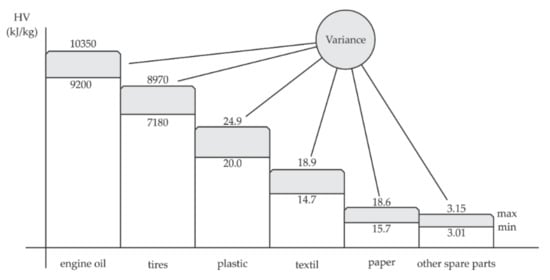
Figure 1.
Distribution of heat value (HV) per flammable components of end-of-life vehicle (ELV).
3.3. The Third Step of the Proposed Methodology
Based on acquired data, throughout the mentioned project, authors of this paper had the goal to estimate all necessary input data by applying Delphi analysis, as the third step of the proposed methodology. Assessed relation for simulation of ELV recycling related to energy recovery is applied.
Total hidden energy (Figure 2) is decomposed on:
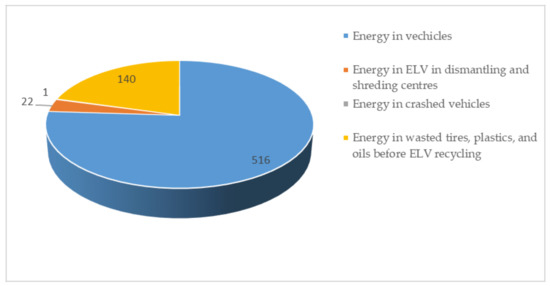
Figure 2.
Distribution of energy in ELV.
- The energy in passenger vehicles,
- The energy in crashed vehicles (domestic and foreign),
- The energy in dismantling and shredding centers, and
- The energy in wasted tires, plastic, oils before ELV recycling (output from annual vehicle maintenance process).
3.4. The Fourth Step of the Proposed Methodology
The fourth step introduces statistical modelling in order to determine the main influencing factors for ELV generation rate. Determining statistical values requires detailed analysis, since ELV recycling in Serbia has a dynamic developing path. Numbers of ELVs have been increasing until the year of 1990. Starting from that year production and import of vehicles rapidly decreased from 250,000 vehicles/year to minimal value of 25,000 vehicle/year [94]. After the year 2010, the number of registered vehicles (NRV) had an increasing trend, especially in the last five years (Figure 3). Due to stricter legal regulations and higher vehicle registration and maintenance costs, the share of number of non-registered vehicles (NURV), i.e., vehicles which are not suited for use in traffic according to directives and legislation demands, had a significant “positive” trend.
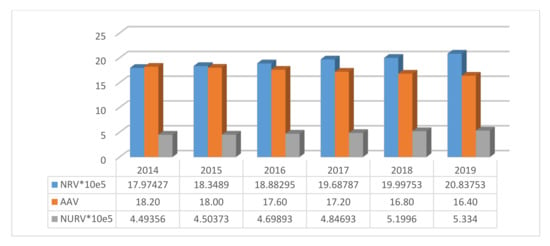
Figure 3.
Comparative trends of number of registered vehicles, number of non-registered vehicles, and age of vehicles (data retrieved from [95]).
However, this trend is not sufficient for safe driving. The average age of vehicles (AAV) is approximately 17 years. In the period from 2014 until 2019 AAV has decreased.
Determination of the recycled ELV numbers presents an issue, since non-registered vehicles do not automatically represent vehicles that are suitable for recycling. In a large number of cases, owners of non-registered vehicles are forced to wait for a better economic situation in order to adapt their vehicles to the requirements and legislation norms, and then re-register them and use them in traffic. Consequently, the gap between non-registered vehicles and recycled ELV (based on official data and data related to recycled ELVs, based on data from dismantling centers and shredding centers) is very large. The average age of the used vehicles (AAV) indicates the necessity for the procurement of new and the recycling of the old vehicles (Figure 4).
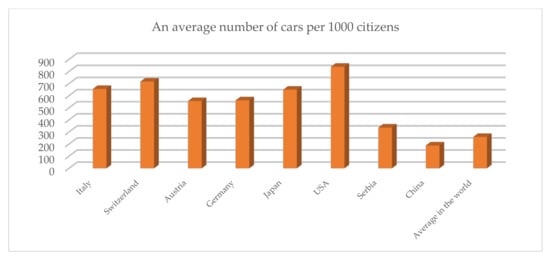
Figure 4.
An average number of cars per 1000 citizens in the year 2019 (obtained and calculated based on the data from [96]).
According to statistical release [97], in the year 2019 there were approximately 1,999,700 passengers’ cars in total in the Republic of Serbia with the following distributions:
- Up to 5 year—450,000;
- 5–10 year—600,000;
- More than 10 year—949,700.
The ELV generation in the previous period had an impact on Recyclable Waste (RW) (Table 1).

Table 1.
Estimation of ELV collection factor.
In the process of incineration, dismantled parts (tires, plastic, oil) and ASR share for incineration are burned. Generated energy depends on burned materials and energy utilization factor, which depends on the technology level (0.7–0.8).
In this research, there were several input results, so that research methodology included modelling of ELV recycling process and application of statistical analysis (SPSS software). By applying statistical modeling, generation rate (GR) has been and compared to (Figure 5):
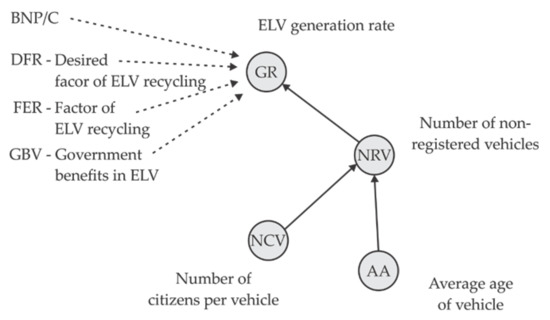
Figure 5.
Initial model for generation rate (GR) determination.
- Number of non-registered vehicles (NRV),
- Gross domestic product (GDP) per capita,
- The factor of ELV recycling (FER),
- The desired factor of ELV recycling (DFR),
- Government benefits per ELV (GBV),
- The average age of vehicles (AAV), and
- The number of citizens per vehicle (NCV).
In the Republic of Serbia, GDP has been slightly increasing during the past few years. Impact of GDP on GR reflects through increase of need for new car purchases and GR increase. Life costs, demand for new vehicles, lifestyle (air conditioning, GPS, phone) are the factors having an influence on GR increase.
The factor of ELV recycling (FER) refers to the percentage of recycled vehicles in the last period. It presents the ability of infrastructure for recycling, as well as the attitude of owners toward recycling. DFR, GDP/c and GBV also influence on this factor.
4. Results
The research has been conducted in the Republic of Serbia with 7.5 million inhabitants. Significance of research and impact of variables have been tested on data from the last seven years.
Based on the defined methodology, MFA was applied in the first step. The MFA approach has been used for problem analysis of special type of waste, i.e., ELV. The special characteristic of ELV as waste are following: High values, high logistic expanses, complexity of recycling, long life cycle of product, with possibilities of renewal, containing dangerous materials, expand over local borders, demands of specific system of collection and treatment.
Through analysis of energy recovery from ELV recycling process, authors distinguished energy, air, labor, and information as inputs, and waste, energy, water, parts manufacturing, and re-used gases as outputs (Figure 6 and Figure 7).
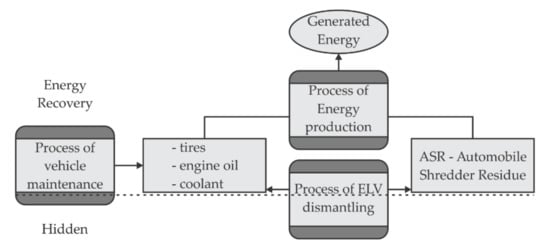
Figure 6.
Energy recovery from ELV recycling process.
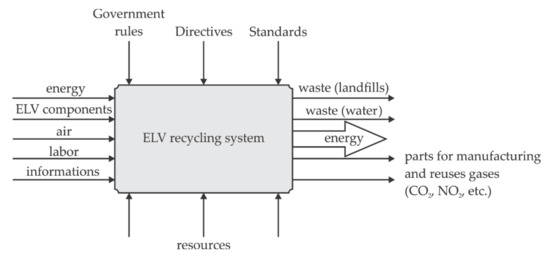
Figure 7.
ELV recycling system.
Based on the defined methodology, second step was applied to determine ELV sub-models. The factor of ELV recycling depends on the desired factor of ELV recycling (DFR), based on literature review and authors’ own investigation in Serbian ELV market. DFR refers to the state’s policy regarding compliance with the EU directive regarding energy efficiency, ELV recycling, environmental protection, etc. It is expressed as the percentage of ELV recyclability. In the Republic of Serbia, it is estimated that this factor has a much lower value, accordingly the target value is that 60% of ELV to be reused and recycled. The factor of ELV recycling depends on national pressure related to the implementation of EU directives and national legislation.
The desired value did not translate to the real factor of ELV recycling following the economic turbulences in Serbia in the period from 2015 until 2017.
Using the input data in the previous period in Serbia an equation has been obtained. The ELV generation rate (GR) can be presented as follows:
Bearing in mind the abovementioned facts, the GR (ELV generation rate) is a variable that has been incorporated into the simulation model (Figure 8), in which the total number of vehicles presents an input, while RW presents an output variable.
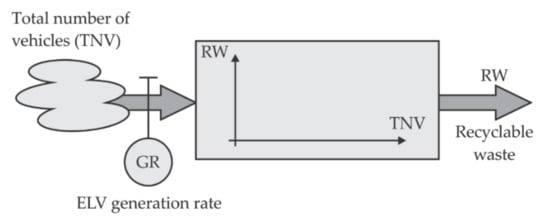
Figure 8.
The first sub-model.
The second sub-model (loop) starts with RW and recyclable collection factor (Figure 9). In the Table 2 data for estimation of ELV collection factor (CF) are presented.
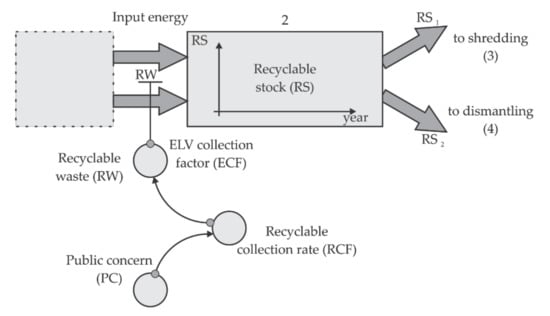
Figure 9.
Second sub-model.

Table 2.
Covering of ELV dismantling centers and public interests.
The third sub-model is focused on collection of ELV components (materials, parts, tires, oils, plastics) (Figure 10). One part of dismantled parts goes to remanufacturing phase and other parts to incineration phase (phase four).
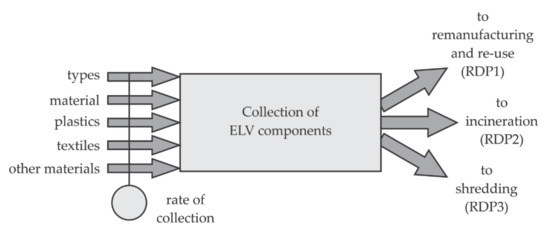
Figure 10.
Third sub-model.
The fourth sub-model is concerned on a shredding stock. Output in this sub-model is the ELV shredding rate which depends on ELV recyclable stock (RDP2) and covering of ELV shredding (CES) (Figure 11), with the obtained data presented in Table 3.
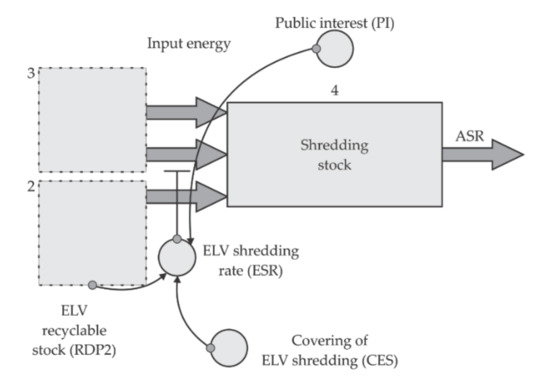
Figure 11.
Fourth sub-model.

Table 3.
Input data for the shredding process.
The fifth loop is concerned with the recyclable dismantled parts (RDP) (Figure 12). Inputs are covering of ELV dismantling centers (RS) and ELV dismantling rate, based on public interest (PI).
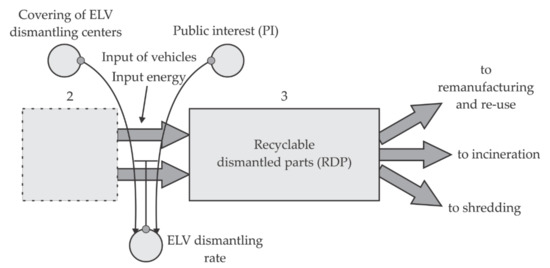
Figure 12.
The fifth sub-model is related to incineration.
Public interest has relatively higher values, however, shredder infestation is also presented with the significantly higher values. Consequently, in the Republic of Serbia, there are one larger, two medium, and three small capacity shredders. ELV shredders covering Serbia are not appropriately geographically distributed (only one covers south and central Serbia). In Table 3 input data for shredding rate in Serbia are presented.
The dominant role of ELV shredders is for the steel industry in Smederevo municipality. A part of ASR can be used for incineration; unfortunately, in Serbia, this part is not significant, and it is smaller than 5% of ASR.
The correlation between observed variables presented in Figure 13 (Table 4) has been obtained. For each relation between variables from Figure 13, correlation and regression analysis have been conducted.
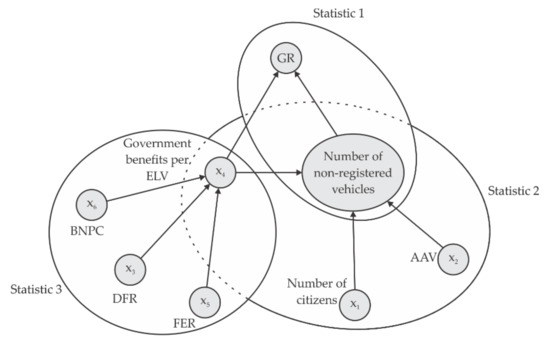
Figure 13.
Statistics based on main factors.

Table 4.
Values of variables.
Research results of the statistical analysis have shown that the correlation between ELV generation rate (GR) and number of non-registered vehicles is R = 0.895 with influence level 0.321 (the first circle from the Figure 13). Also, the results of statistical analysis have shown that the number of non-registered vehicles has significant correlation with the variable related to the number of citizens per vehicle (correlation: −0.765) and with the variable related to the average age of the vehicle (correlation: −0.316). Furthermore, statistical analysis has proven significant correlation results between GR and variable representing the desired factor of ELV recycling X3 (higher than 0.8).
The relation between variables GR and number of non-registered vehicles is significant (Statistics 1). Pearson correlation between these two variables is 0.895 (Table 5).

Table 5.
Correlations between GR and number of non-registered vehicles.
Regression analysis presents an equation of possible relation between variables GR and a number of non-registered vehicles (GR could be observed as an independent variable). In this specific case the equation may be formulated as following: GR = B0 + B1 * NVR. The important values from Table 6 are B0 = 4.666—correction factor (constant) and B1 = 0.321 (slope).

Table 6.
Coefficients.
Correlation coefficients values determined for variables from the Figure 13 (Statistics 2) are presented in Table 7 (all correlations are negative).

Table 7.
Correlations between number of non-registered vehicles, number of citizens per vehicle, and average age of vehicles.
Based on Table 8 and Table 9, descriptive statistics for variables ECF and RCF (mean value and standard deviation) are determined (Table 10).

Table 8.
Additional variables for calculation.

Table 9.
Additional variables for calculation (values in 0–10 range).

Table 10.
Descriptive statistics (mean value and standard deviation) for ECF and RCF.
Pearson correlation between ECF and RCF connected with the model in Figure 8 (the line that connects ECF and RCF) is presented in Table 11.

Table 11.
Pearson correlation between ECF and RCF.
Regression analysis presents equation of connection between variables RCF and ECF. The important values from Table 6 are B0 = 0.358—constant and B1 = 0.930 (slope), other values have less importance (Table 12).

Table 12.
Coefficients (RCF and ECF).
Descriptive statistics (mean value and standard deviation Table 13) for values PC and RCF. Description of connection PC and RCF on the model presented in Figure 7. Correlation between RCF and PC is 0,989 (Table 14).

Table 13.
Descriptive statistics (mean value and standard deviation) for public concerns (PC) and recyclable collection fate (RCF).

Table 14.
Correlation between RCF and PC.
Regression analysis presents an equation of connection between variables RCF and PC. The form of equation is RCF = 1.311 + 1.212 * PC (Table 15).

Table 15.
Coefficients RCF and PC.
On the basis of the research results and by applying research results from [3], Figure 5, Figure 6 and Figure 7, and Table 1 it can be concluded that the impact of ELV recycling on the structure of renewable energy sources for the Republic of Serbia can be significant, which means that there is a lot of room for improving the recycling process, the use of resources, and greater efficiency in obtaining energy through recovery and reuse.
5. Discussions
5.1. Discussion on Research Results
The authors of this paper have identified five sub-models of ELV process in the Republic of Serbia representing the mutual influence of certain ELV parameters: (1) First sub-model—representing the influence of total number of vehicles on ELV generation rate; (2) second sub-model—representing the influence of recyclable waste, recyclable collection rate, and public concern on ELV collection factor; (3) third sub-model—representing the influence of rate of collection on distribution of ELV components for remanufacturing and reuse, incineration, and shredding; (4) fourth sub-model—representing the influence of ELV recyclable stock and covering of ELV shredding on ELV shredding rate; (5) fifth sub-model—representing the influence of covering of ELV dismantling centers, ELV dismantling rate, and public interest on recyclable dismantled parts. Through these sub-models, the authors have tried to define the overall model of the recycling process in the Republic of Serbia.
Public interest has a positive influence on energy recovery from ELV and is presented on developed models (Figure 8, Figure 9, Figure 10, Figure 11 and Figure 12) as well as for statistical analysis for the first and second sub-models. In all sub-models, it was determinate that public interest is presented through the following variables: PC (public interest), the average age of vehicles, recyclable collection rate, and the desired factor of recycling.
Based on the performed statistical analysis, it may be concluded that the correlation between ELV generation rate (GR) and number of non-registered vehicles is significant. Similar results have been confirmed between number of non-registered vehicles and number of citizens per vehicle factors with negative influence, while the correlations between number of non-registered vehicles, number of citizens per vehicle, related to the average age of vehicles are not significant. Conclusion may be derived that, although it is difficult to establish the exact number of non-registered vehicles destined for recycling, it can be concluded that their number may indicate an ELV generation rate (GR). In addition, it can be concluded that with the rate of increase in the number of citizens per vehicle, there is a decrease in the number of unregistered vehicles, which may indicate that the purchasing power and lifestyle of vehicle users are improving.
Authors concluded that within contemporary lifestyle ELVs can be viewed as a renewable energy source (especially in developing countries); that energy recovery from ELVs depends on ELV type structure and incorporated basic materials; public concern has a positive influence on energy recovery from ELVs, and the ratio between possible and actual energy from ELVs is insufficient in the present moment in developing countries.
The statistical analysis results can be considered as guidelines that indicate the large potential of ELVs when it comes to renewable energy sources. This potential should be used according to the public interest and sustainable development. Meaning that the percentage related to the level of recyclability, the amount of ELV reuse, and usage of ASR should be higher after shredding.
So far, few countries in the world have developed a successful recycling system for ELVs including energy recovery, namely the European Union, Japan, China, Korea, and Taiwan. Russia, India, Mexico, Turkey, and Vietnam are preparing to introduce this type of legislative system for waste vehicle management. More than 80% of the ELVs’ weight can be recycled in car recycling plants around the world.
More than half of the total ELVs’ weight consists of parts made of cast iron and steel (55%), about 11% of the car is occupied by plastic, then aluminum alloys (9%), rubber (7%), and glass (3%). The share of non-ferrous alloys (magnesium, titanium, copper, and zinc) does not exceed 1%. Other materials such as varnishes, paints, electrical wires, coated materials, etc., make up 13.5% of cars. In a series of mechanical and physical processes, ferrous and non-ferrous metals are separated for further recycling.
The advantages of materials recycling are not only a smaller impact on the environment due to the disposal of waste in landfills, but also the protection of non-renewable sources and energy conservation. The energy savings resulting from the recovery, compared to the energy used to obtain metals from their primary source, range from 60% to 95%. For example, the production of 1 kg of base oil from regenerated used oil requires about one third less energy than the production of the same from crude oil.
The most efficient is the recycling of aluminum, which saves over 95% of the energy needed to produce this metal from its primary source of bauxite, thus reducing greenhouse gas emissions by 95%. Energy savings by materials in car recycling are shown in Table 16.

Table 16.
Energy savings from different sources [98].
The rest of these processes (ASR) account for about 20–25% of the total weight of the ELVs and it is a weak point in vehicle recycling. This residue, despite being toxic enough to be considered as hazardous waste in many countries, can also be considered an energy source as it contains more than 7% fuel [99].
5.2. Limitations of the ELV Recycling and Energy Recovery Process
Even though the recycling process in the Republic of Serbia is gaining wider attention by state representatives, scholars, and public community, it is hard to believe that the target value of 95% ELV usage for recovery and reuse, proposed by European Commission Directive 2005/53/EC (2000), will be achieved.
The ELV waste flow in the Republic of Serbia is not clearly defined, due to inadequate communication between automotive manufacturers, components production companies, dismantling centers, authorities, and public communal companies. Most dismantling centers focus on the direct monetary value of the parts, while reuse or recycling value get neglected, leading to the fact that the parts with lower monetary values end up as landfill. An additional problem is the price of new raw materials, which in some cases can be significantly lower than the price of recycled materials. The higher price of recycled materials comes as a consequence of the small amount of material used in the recycling process, consequently, the price per unit of recycled material is very high. Observing the technical issues of the ELV disassembly process, it can be observed that older vehicles have not been designed with future disassembling, i.e., destructive disassembling process, in mind. Additional issues of vehicle disassembly centers relate primarily to toxic, expensive, rare, nonrenewable, strategic materials, and also materials whose composition and origin are difficult to determine, to conduct a proper recycling process. Ensuring safe and secure working requirements represents an obligation for all ELV dismantling centers, so that an adequate dismantling environment can be maintained. The stated issues and requirements can be overcome and fulfilled if the automation and modernization of the ELV disassembly process are incorporated.
Although overall recycling process is carried out with good intentions, when it comes to pollution, it can easily happen that a certain amount of secondary pollution is generated during the dismantling process. This shortcoming can be overcome by continuous monitoring of the dismantling process.
In this paper, the authors focused on defining general influencing factors in the ELV dismantling process, however, for future research the authors acknowledge the opportunity to expand the study with other influencing factors and parameters including the rate of rubber from tires usage, the rate of plastics, glass, and non-ferrous metals (aluminum) usage, etc.
In order to achieve the target value of ELV recycling rate proposed by the European Union, it is necessary to include appropriate techniques for ASR recycling, which at the same time have the least pollution impact.
The important aspect is the current level of reuse or recovery of energy from ELV (in different regions in the world) as well as different directives that will direct efforts in this field. When it comes to the EU, the Directive on End-of-Life Vehicles 2000/53/EC has large importance [100]. The data from the same ELV directive point out that until 2015 the recovery from ELVs was supposed to beat at least 95% of the ELV weight, while re-use and recycling was supposed to amount to at least 85% from the same source by an average weight per vehicle and year. Also, 5% of the material can be incinerated. The European policies on ELV are analyzed in [20]. Authors analyzed the ELV system and the induced innovation process with three main innovation paths: (1) Material—market creation path, (2) energy—market creation path, and (3) radical substitution path. They concluded that ELVs (3R) in the EU are still inaccurate, with some huge deviations between EU countries. Mean value is about 75%, with different authors providing results from different world regions. In the year 2017 in China the estimations were that there are 7.3 million ELVs, with a scrap rate of 4% and nearly 30% ELVs recycled [101]. According to [6], target value for reuse and recovery of ELVs in EU has been 95% until January 1, 2020. Furthermore, while there is no significant number of systematic reviews of ELV recycling management in China [4], forecasts are that in the year 2020 the following values should be achieved [6]: For remanufacturing 10% of scraped vehicles (ELV), for reuse 10%, and for recycling 15%. In the same period, compression sharing and packing has been forecasted to be at 54%, shredding and sorting 4.8%, automotive shredder residue (ASR) recovery 1.2%, and landfill 5%. Chen [8] analyzed elements of ELV strategy using a comparison between Taiwan, Korea, Japan, and The Netherlands. In the first country, the share of ELV in registered vehicles was 4% with more than 95% of recyclable material and ASR (vehicle shell and heat recovery included). In Korea the share was 3.4% and 85%, in Japan was 6.25% and 85%, and The Netherlands was 2.7% and 85%. Through analysis of shredding, process authors emphasized the ELV shredding process with three major systems (shredding system, sorting system, and mobile machines). Santini [9] analyzed the energy recovery efficiency of ELV in Italy. In Italy, in the year 2006, 83% of the total amount of 1,354,205 ELVs were shredded. After shredding, ASR consists of ferrous metals (72.1% of total shredded material) and non-metallic residues of 23.6%. The waste consists of 8% of metals and up to 40% of plastic (both soft and hard) and polyurethane foam (PUF) that could be separated and treated using post-shredding technologies. Textile and fibers account for 28% of the remaining fraction and could be recovered. Also, a lower heat value (LHV) is cca 20,000 kJ/kg with content of about 30%. Some of the authors [4,16] have taken into account the number of abandoned vehicles (AV) including environmental, social, crime-related, and waste as resources. The percentage of abandoned AV in Iceland is more than 20%.
Important limitations are disassembling as well as the structure of vehicle as inputs for reuse or recovery of energy from ELV. In [10,102], authors investigate disassembling of ELVs. Inputs in the design of end-of-life value are International Materials Data Systems (IMDS), Teardown data, and End-of-Life material data. On a vehicle, the level is identified as assemblies and materials. On a part, the level is introduced as Design for Modular Recovery and Design for Shredding. According to [3], structure of one middle-class vehicle (with total weight 1,232.9 kg with added tire, waste oil, and waste fluid is 1,380.0 kg) follows: 390 kg for the body, 280 kg for the engine, 116.8 kg for chassis 82 kg for rubber plastic and interior, 59.4 kg for the seats, 54 kg for the door, 30 kg for rear rate, 22 kg for harness, 20.8 kg for the muffler, 20.4 kg for brake rotor, 18.5 kg for the bonnet, 17.6 kg for spring, 16.8 kg for brake caliper, 15.6 kg for glass, 12.4 kg for strut, etc.
Another important limitation is the logistic network for recycling and disposal of ELVs. In Cruz-Rivera and Ertel [18], the authors investigated reverse logistic network with material streams for recycling and disposal of ELVs in the EU. In this article, output from dismantling centers are reusable parts and materials for recycling (old tires, fluids, batteries, glass, plastic parts, and catalytic converters) in the amount of 10% in the year 2015. The remainder of ELVs goes to the shredding process. After shredding the heavy metals, separation of non-ferrous scrub in amount of 70% and after material preparation, the amount of 5% material goes into the recycling process. The shreddedd light fraction, after preparation, can be used for recycling (energy material) in amount of 10% and disposed of in the amount of 5%.
6. Conclusions
Renewable energy is a paradigm that has become increasingly important in the last 20 years, both for business organizations and national economies. In contemporary lifestyle, ELVs can be viewed as renewable energy sources, since the number of vehicles increases every year. Every business organization or national economy considers its factors of renewable energy and seeks a social path towards the creation of sustainable development, competitiveness, and resilience. One of the recognized factors in the world is ELV recycling and energy recovery process, but the impact on the level of sustainable development has not been explored enough.
Based on the presented data and analysis described above, a few conclusions could be derived. In developing countries and regions with automobile numbers growing, establishing collection and recycling infrastructure of ELV is an important issue.
The following scientific contribution of these researches are emphasized:
- A model of sustainable ELV recycling and energy recovery for conditions in the Republic of Serbia has been developed and verified;
- The influence of the ELV recycling process elements on the environment was assessed, with a positive effect on the environment;
- An assessment of the impact of ELV recycling as a source of energy stability, with energy recovery as an option for ELV elements that cannot be further recycled, such as ASR residue, waste oils, etc., has been performed;
- The state of ELV recycling in Serbia has been determined;
- ELV recycling trends have been identified in the world and in Serbia;
- Key factors for ELV recycling and energy recovery in Serbia have been identified;
- The possible effects of improving the ELV recycling process on the sustainability of ELV recyclers, the ELV recycling industry, and the sustainable development of the Republic of Serbia have been determined.
There are several strengths of the proposed approaches, that are reflected through the observation of ELV recycling as a renewable energy source; through the novel model of recycling as an energy source with emphasis on the main factors for obtaining energy from ELV; and the verification of the proposed novel model on the data from the Republic of Serbia as a developing country.
The main benefit of the economy is related to the creation of the basis for the realization of the circular economy concept. The additional economic benefit could be derived from the fact that the number of landfills and the expenses for their lease and maintenance will be reduced. Furthermore, through development in ELV recycling and energy recovery, economic benefits will include reduction of energy dependency and emergence of new job positions in the field of recycling and energy production processes.
In the structure of vehicle (and it means ELV) there are components with high potential as a source for renewable energy. Energy recovery from ELV depends on ELV type, structure, and incorporated materials. The percentage of metal parts in vehicles decreases because there is a trend toward lighter structures and new materials, which is a higher potential value for energy recovery (on the other side). The percentage of plastic parts increases and, for energy recovery, emergence and implementation of standards for tire replacement and usage of waste oil is important. An analysis presented in this paper suggests that replacement of tires on a two-year basis instead of a five-year basis increases energy recovery for 12%. Changes in the composition of materials used in the automotive industry and the increasing cost of disposing of non-recyclable ELV parts raise a number of questions about the future of ELV recycling and energy recovery in the world. In response to the challenges, new and innovative approaches to vehicle recycling are being developed in the world’s most developed countries. An important aspect in car production is the impact of these changes on ELVs and on the amount of waste that must be disposed.
If ELVs’ impact on the environment is considered, a large number of illegal landfills, fluids spillage on the ground and watercourses, heavy metals, plastics, rubber, etc., cannot be neglected. Consequently, the following environmental effects are expected: Elimination of illegal landfills, proper handling of fluids and their complete recycling, complete recycling of all metallic materials (iron/steel, non-ferrous metals), maximum possible recycling of other materials (plastic, rubber, glass, etc.), disposal of permanent waste at designated landfills, improvement of the quality of the environment in the Republic of Serbia by removing ELVs from the natural environment, sustainable use of natural resources due to reuse of already used materials, and indirect impact on improving the quality of the environment due to recycling of materials at a higher level of processing. Having this in mind, the conducted study represents one of the initial researches on ELV recycling end energy recovery in Republic of Serbia. During the research, the following problems were noticed:
- Used motor vehicles are generally not treated in a way that ensures the protection of the environment;
- The system for recycling ELVs has not been established, i.e., there is no globally organized management of this type of waste;
- There is car waste where customers, with the appropriate monetary compensation, usually “take off” what they need from motor vehicles. Car waste is often used to incinerate car parts, which is not legally allowed;
- Preparation of materials for recycling is done in a small number of companies, mostly metals, certain car parts, mainly clamps, oscillating shoulders, brake pedals, stabilizer bars;
- That is, all parts of special importance for the safety of motor vehicles are often repaired, whereby there is no control of product quality and most often this is done with inadequate materials and technologies.
Accordingly, the following directions of further research are highlighted:
- Detailed identification of infrastructure for ELV recycling;
- Improvement of the ELV recycling and energy recovery sustainability model, with research of the relationships between variables in this model;
- Greater involvement of resilience factors and productivity of the recycling process;
- Greater inclusion of leadership factors in the model of sustainable ELV recycling, etc.
Generally, ELV recycling and energy recovery process includes dismantling, shredding, incineration, and remanufacturing. However, there are various techniques that contribute to improving the efficiency of the ELV recycling and energy recovery process. It is important to keep in mind that each recycling system can be modified to suit the specific situation of each country.
The research showed the great importance of the recycling process in the Republic of Serbia, but it also showed that there is significant space for its improvement and further growth. The recycling industry could be improved by incorporation of novel recycling technologies, further raising of awareness about the ELV recycling process, or by applying measures aimed at achieving higher productivity, with all this area demanding sustainable resources, that are often beyond the capabilities of regular industrial organizations.
Author Contributions
Conceptualization, Z.K. and S.A.; methodology, S.A. and M.M.; software, A.Đ.; validation, M.S. and M.M.; formal analysis, M.M.; investigation, V.P.; resources, V.P.; data curation, A.Đ.; writing—original draft preparation, V.P.; writing—review and editing, A.Đ.; visualization, V.P.; supervision, M.S.; project administration, S.A.; funding acquisition, Z.K. All authors have read and agreed to the published version of the manuscript.
Funding
This research received no external funding.
Conflicts of Interest
The authors declare no conflict of interest.
References
- Sorensen, B. Renewable Energy, 3rd ed.; Elsevier Academic, Nederland: Amsterdam, The Netherlands, 2004; pp. 32–45. [Google Scholar]
- Murphy, J.; Mc Keogh, E. Technical, economic and environmental analysis of energy production from municipal solid waste. Renew. Energy 2004, 29, 1043–1057. [Google Scholar] [CrossRef]
- OECD Statistics. Passenger Car Registrations (Indicator). 2020. Available online: https://data.oecd.org/transport/passenger-car-registrations.htm (accessed on 24 August 2020).
- Zhou, F.; Lim, M.K.; He, Y.; Lin, Y.; Chen, S. End-of-life vehicle (ELV) recycling management: Improving performance using an ISM approach. J. Clean. Prod. 2019, 228, 231–243. [Google Scholar] [CrossRef]
- Gass, V.; Schimidt, J.; Schimid, E. Analysis of alternative policy instruments to promote electric vehicles in Austria. Renew. Energy 2014, 61, 96–101. [Google Scholar] [CrossRef]
- Wang, L.; Chen, M. Policies and perspectives on end-of-life vehicles in Chine. J. Clean. Prod. 2013, 44, 168–176. [Google Scholar] [CrossRef]
- Belingardi, G.; Beyene, A.T.; Koricho, E.G.; Martorana, B. Alternative lightweight materials and component manufacturing technologies for vehicle frontal bumper beam. Compos. Struct. 2015, 120, 483–495. [Google Scholar] [CrossRef]
- Chen, K.; Huang, S.; Lian, I. The development prospect of the end-of-life vehicle recycling system in Taiwan. Waste Manag. 2010, 30, 1661–1669. [Google Scholar] [CrossRef]
- Santini, A.; Morselli, L.; Passarini, F.; Vassura, I.; Di Carlo, S.; Bonino, F. End-of-Life Vehicles management: Italian material and energy recovery efficiency. Waste Manag. 2011, 31, 489–494. [Google Scholar] [CrossRef]
- Go, T.F.; Wahab, D.A.; Rahman, M.A.; Ramli, R.; Azhari, C.H. Disassemblability of end-of-life vehicle: A critical review of evaluation methods. J. Clean. Prod. 2011, 19, 1536–1546. [Google Scholar] [CrossRef]
- Simic, V. Interval-parameter chance-constraint programming model for end-of-life vehicles management under rigorous environmental regulations. Waste Manag. 2016, 52, 180–192. [Google Scholar] [CrossRef]
- Simic, V. End-of-life vehicle recycling—A review of the state-of-the-art. Tech. Gaz. 2013, 20, 371–380. [Google Scholar]
- Zimon, D.; Tyan, J.; Sroufe, R. Implementing Sustainable Supply Chain Management: Reactive, Cooperative, and Dynamic Models. Sustainability 2019, 11, 7227. [Google Scholar] [CrossRef]
- Zimon, D.; Madzík, P. Standardized management systems and risk management in the supply chain. Int. J. Qual. Reliab. Manag. 2019, 37, 305–327. [Google Scholar] [CrossRef]
- Bellmann, K.; Khare, A. Economic issues in recycling end-of-life vehicles. Technovation 2000, 20, 677–690. [Google Scholar] [CrossRef]
- Smith, M.; Jacobson, J.; Webb, B. Abandoned vehicles in England: Impact of the end of life directive and new initiatives, on likely future trends. Resour. Conserv. Recycl. 2004, 41, 177–189. [Google Scholar] [CrossRef]
- Mazzanti, M.; Zoboli, R. Economic instruments and induced innovation: The European policies on end-of-life vehicles. Ecol. Econ. 2006, 58, 318–337. [Google Scholar] [CrossRef]
- Cruz-Rivera, R.; Ertel, J. Reverse logistics network design for the collection of end-of-life vehicles in Mexico. Eur. J. Oper. Res. 2009, 196, 930–939. [Google Scholar] [CrossRef]
- Kaplan, P.O.; Decarolis, J.; Thorneloe, S. Is it better to burn or bury waste for clean electricity generation? Environ. Sci. Technol. 2009, 43, 1711–1717. [Google Scholar] [CrossRef]
- Watanabe, C. Identification of the role of renewable energy: A view from Japan’s challenge: The New Sunshine Program. Renew. Energy 1995, 6, 237–274. [Google Scholar] [CrossRef]
- Sufian, M.A.; Bala, B.K. Modelling of electrical energy recovery from urban solid waste system: The case of Dhaka city. Renew. Energy 2006, 31, 1573–1580. [Google Scholar] [CrossRef]
- Eriksson, O.; Bisaillon, M.; Haraldsson, M.; Sundberg, J. Integrated waste management as a mean to promote renewable energy. Renew. Energy 2014, 61, 38–42. [Google Scholar] [CrossRef]
- WRME. Waste and recycling—Middle East (WRME), Special Supplement: Auto Recycling, 2014/2015. 2014. Available online: http://waste -recyclingme.ae/WR%20-Suppliment%202014-15.pdf (accessed on 24 August 2020).
- Karagoz, S.; Aydin, N.; Simic, V. End-of-life vehicle management: A comprehensive review. J. Mater. Cycles Waste 2020, 22, 416–442. [Google Scholar] [CrossRef]
- Patlitzianas, K.D.; Doukas, H.; Kagiannas, A.G.; Psarras, J. Sustainable energy policy indicators: Review and recommendations. Renew. Energy 2008, 33, 966–973. [Google Scholar] [CrossRef]
- Kim, S.S.; Kim, J.; Jeon, J.K.; Park, Y.K.; Park, C.J. Non-isothermal pyrolysis of the mixtures of waste automobile lubricating oil and polystyrene in a stirred batch reactor. Renew. Energy 2013, 54, 241–247. [Google Scholar] [CrossRef]
- Barry, D.M.; Kanematsu, H. European Union (EU) directives and regulations. In Corrosion Control and Surface Finishing; Springer: Tokyo, Japan, 2016; pp. 89–96. [Google Scholar]
- Wang, Z.; Hao, H.; Gao, F.; Zhang, Q.; Zhang, J.; Zhou, Y. Multi-attribute decision making on reverse logistics based on DEA-TOPSIS: A study of the Shanghai End-of-life vehicles industry. J. Clean. Prod. 2019, 214, 730–737. [Google Scholar] [CrossRef]
- Nakajima, Y.; Matsuyuki, M. Utilization of waste tires as fuel for cement production. Conserv. Recycl. 1981, 4, 145–151. [Google Scholar] [CrossRef]
- Yang, Y.; Hu, J.; Liu, Y.; Chen, X. Alternative selection of end-of-life vehicle management in China: A group decision-making approach based on picture hesitant fuzzy measurements. J. Clean. Prod. 2019, 206, 631–645. [Google Scholar] [CrossRef]
- Boustani, A.; Sahni, S.; Gutowski, T.; Graves, S. Tire remanufacturing and energy savings. In Environmentally Benign Manufacturing Laboratory, Sloan School of Management; MITEI: Cambridge, Massachusetts, USA, 2010. [Google Scholar]
- Charrette, Y.E. Waste to Energy Background Paper; 2011; Whitehorse, YC, Canada. [Google Scholar]
- Lam, S.S.; Chase, H.A. A review on waste to energy processes using microwave pyrolysis. Energies 2012, 5, 4209–4232. [Google Scholar] [CrossRef]
- Antoniou, N.; Zabaniotou, A. Features of an efficient and environmentally attractive used tyres pyrolysis with energy and material recovery. Renew. Sustain. Energy Rev. 2013, 20, 539–558. [Google Scholar] [CrossRef]
- Giles-Corti, B.; Vernez-Moudon, A.; Reis, R.; Turrell, G.; Dannenberg, A.L.; Badland, H.; Foster, S.; Lowe, M.; Sallis, J.F.; Stevenson, M.; et al. City planning and population health: A global challenge. Lancet 2016, 388, 2912–2924. [Google Scholar] [CrossRef]
- James, A.T.; Gandhi, O.P.; Deshmukh, S.G. Development of methodology for the disassemblability index of automobile systems using a structural approach. Proc. Inst. Mech. Eng. Part D J. Automob. Eng. 2017, 231, 516–535. [Google Scholar] [CrossRef]
- Sakai, S.I.; Noma, Y.; Kida, A. End-of-life vehicle recycling and automobile shredder residue management in Japan. J. Mater. Cycles Waste Manag. 2007, 9, 151–158. [Google Scholar] [CrossRef]
- Rafaj, P.; Amann, M. Decomposing air pollutant emissions in Asia: Determinants and projections. Energies 2018, 11, 1299. [Google Scholar] [CrossRef]
- Kibira, D.; Jain, S. Impact of hybrid and electric vehicles on automobile recycling infrastructure. In Proceedings of the Winter Simulation Conference, Phoenix, AZ, USA, 11–14 December 2011; pp. 1072–1083. [Google Scholar]
- Hao, H.; Cheng, X.; Liu, Z.; Zhao, F. Electric vehicles for greenhouse gas reduction in China: A cost-effectiveness analysis. Transp. Res. Part D Transp. Environ. 2017, 56, 68–84. [Google Scholar] [CrossRef]
- Dodić, S.N.; Vučurović, D.G.; Popov, S.D.; Dodić, J.M.; Zavargo, Z.Z. Concept of cleaner production in Vojvodina. Renew. Sustain. Energy Rev. 2010, 14, 1629–1634. [Google Scholar] [CrossRef]
- Altay, M.C.; Sivri, N.; Onat, B.; Şahin, Ü.; Zorağa, M.; Altay, H.F. Recycle of metals for end-of-life vehicles (ELVs) and relation to Kyoto protocol. Renew. Sustain. Energy Rev. 2011, 15, 2447–2451. [Google Scholar] [CrossRef]
- Lopes, M.A.R.; Antunes, C.H.; Martins, N. Energy behaviours as promoters of energy efficiency: A 21st century review. Renew. Sustain. Energy Rev. 2012, 16, 4095–4104. [Google Scholar] [CrossRef]
- Wee, H.M.; Yang, W.H.; Chou, C.W.; Padilan, M.V. Renewable energy supply chains, performance, application barriers, and strategies for further development. Renew. Sustain. Energy Rev. 2012, 16, 5451–5465. [Google Scholar] [CrossRef]
- De Queiroz Lamas, W.; Palau, J.C.F.; de Camargo, J.R. Waste materials co-processing in cement industry: Ecological efficiency of waste reuse. Renew. Sustain. Energy Rev. 2013, 19, 200–207. [Google Scholar] [CrossRef]
- Benkovic, S.; Makojevic, N.; Jednak, S. Possibilities for development of the electric power industry of Serbia through private source financing of small hydropower plants. Renew. Energy 2013, 50, 1053–1059. [Google Scholar] [CrossRef]
- Rovinaru, F.I.; Rovinaru, M.D.; Rus, A.V. The Economic and Ecological Impacts of Dismantling End-of-Life Vehicles in Romania. Sustainability 2019, 11, 6446. [Google Scholar] [CrossRef]
- Andersson, M.; Söderman, M.L.; Sandén, B.A. Challenges of recycling multiple scarce metals: The case of Swedish ELV and WEEE recycling. Resour. Policy 2019, 63, 101403. [Google Scholar] [CrossRef]
- Andersson, M.; Söderman, M.L.; Sandén, B.A. Adoption of systemic and socio-technical perspectives in waste management, WEEE and ELV research. Sustainability 2019, 11, 1677. [Google Scholar] [CrossRef]
- Yi, S.; Lee, H. Policies to Promote Resource Circulation through an Economic Analysis of End-of-Life Vehicles in Korea; ISSE: Long Beach, CA, USA, 2019; pp. 372–372. [Google Scholar]
- Miller, L.; Soulliere, K.; Sawyer-Beaulieu, S.; Tseng, S.; Tam, E. Challenges and alternatives to plastics recycling in the automotive sector. Materials 2014, 7, 5883–5902. [Google Scholar] [CrossRef]
- Huang, J.; Tian, C.; Ren, J.; Bian, Z. Study on impact acoustic—Visual sensor-based sorting of ELV plastic materials. Sensors 2017, 17, 1325. [Google Scholar] [CrossRef] [PubMed]
- National assembly of the Republic of Serbia. Energy Law [Zakon o energetici]. Оfficial Gazette of the Republic of Serbia 84/04. 2004. Available online: http://www.parlament.gov.rs/content/eng (accessed on 27 June 2020).
- Pavlović, T.; Milosavljević, D.; Radonjić, I.; Pantić, L.; Radivojević, A.; Pavlović, M. Possibility of electricity generation using PV solar plants in Serbia. Renew. Sustain. Energy Rev. 2013, 20, 201–218. [Google Scholar] [CrossRef]
- National assembly of the Republic of Serbia. Act for Incentive Measures for Privileged Producers of Electricity [Uredba o Merama Podsticaja za Povlašćene Proizvođače Električne Energije]. Official Gazette of the Republic of Serbia 8/2013. Available online: https://www.mre.gov.rs/doc/efikasnost-izvori/B02 Uredba o merama podsticaja za povlascene proizvodjace05.02.15.pdf (accessed on 27 June 2020).
- Wong, Y.C.; Al-Obaidi, K.M.; Mahyuddin, N. Recycling of end-of-life vehicles (ELVs) for building products: Concept of processing framework from automotive to construction industries in Malaysia. J. Clean. Prod. 2018, 190, 285–302. [Google Scholar] [CrossRef]
- Zhou, Z.; Dai, G.; Cao, J.; Guo, G. A novel application of PSO algorithm to optimize the disassembly equipment layout of ELV. Int. J. Simul. Syst. Sci. Technol. 2016, 17, 161–165. [Google Scholar]
- Saleh, H.M.; Husain, M.N.; Isa, A.A.M. New Solution for ICT/ELV Infrastructure Project Reporting Using Datalink Technique System. J. Telecommun. Electron. Comput. Eng. 2018, 10, 57–62. [Google Scholar]
- Pan, Y.; Li, H. Sustainability evaluation of end-of-life vehicle recycling based on energy analysis: A case study of an end-of-life vehicle recycling enterprise in China. J. Clean. Prod. 2016, 131, 219–227. [Google Scholar] [CrossRef]
- Soo, V.K.; Peeters, J.; Compston, P.; Doolan, M.; Duflou, J.R. Comparative study of end-of-life vehicle recycling in Australia and Belgium. Procedia Cirp. 2017, 61, 269–274. [Google Scholar] [CrossRef]
- Mohan, T.K.; Amit, R.K. Dismantlers’ dilemma in end-of-life vehicle recycling markets: A system dynamics model. Ann. Oper. Res. 2020, 290, 591–619. [Google Scholar] [CrossRef]
- Xiao, Z.; Sun, J.; Shu, W.; Wang, T. Location-allocation problem of reverse logistics for end-of-life vehicles based on the measurement of carbon emissions. Comput. Ind. Eng. 2019, 127, 169–181. [Google Scholar] [CrossRef]
- Hartman, H.; Hernborg, N.; Malmsten, J. Increased Re-use of components from ELV’s: A sign of customer and environmental care (No. 2000-01-1513). In SAE Technical Paper; SAE International: Warrendale, Pennsylvania Troy, Michigan, USA, 2000. [Google Scholar]
- Díaz, V.; Fernández, M.G. Treatment center of end-of-life vehicles (No. 2001-01-3745). In SAE Technical Paper; SAE International: Warrendale, Pennsylvania Troy, Michigan, USA, 2001. [Google Scholar]
- Zhang, X.; Ao, X.; Cai, W.; Jiang, Z.; Zhang, H. A sustainability evaluation method integrating the energy, economic and environment in remanufacturing systems. J. Clean. Prod. 2019, 239, 118100. [Google Scholar] [CrossRef]
- Arowosola, A.; Gaustad, G. Estimating increasing diversity and dissipative loss of critical metals in the aluminum automotive sector. Resour. Conserv. Recycl. 2019, 150, 104382. [Google Scholar] [CrossRef]
- Özdemir, A.; Özkan, A.; Günkaya, Z.; Banar, M. Decision-making for the selection of different leachate treatment/management methods: The ANP and PROMETHEE approaches. Environ. Sci. Pollut. R. 2020, 27, 19798–19809. [Google Scholar] [CrossRef] [PubMed]
- Desnica, E.; Vulić, M.; Nikolić, M. AHP method in the function of adequate equipment choice for ELV detoxifcation in Serbia and EU. Appl. Eng. Lett. 2016, 1, 115–121. [Google Scholar]
- Berzi, L.; Delogu, M.; Giorgetti, A.; Pierini, M. On-feld investigation and process modelling of end-of-life vehicles treatment in the context of Italian craft-type authorized treatment facilities. Waste Manag. 2013, 33, 892–906. [Google Scholar] [CrossRef]
- Sun, Y.; Wang, Y.T.; Chen, C.; Yu, B. Optimization of a regional distribution center location for parts of end-of-life vehicles. Simulation 2018, 94, 577–591. [Google Scholar] [CrossRef]
- Wan, Z.; Liu, J.; Zhang, J. Nonlinear optimization to management problems of end-of-life vehicles with environmental protection awareness and damaged/aging degrees. J. Ind. Manag. Optim. 2019, 13, 2117–2139. [Google Scholar] [CrossRef]
- Schmidt, W.P.; Dahlqvist, E.; Finkbeiner, M.; Krinke, S.; Lazzari, S.; Oschmann, D.; Pichon, S.; Thiel, C. Life cycle assessment of lightweight and end-of-life scenarios for generic compact class passenger vehicles. Int. J. Life Cycle Assess. 2004, 9, 405–416. [Google Scholar] [CrossRef]
- Smith, V.M.; Keoleian, G.A. The value of remanufactured engines: Life-cycle environmental and economic perspectives. J. Ind. Ecol. 2008, 8, 193–221. [Google Scholar] [CrossRef]
- Amaral, J.; Ferrao, P.; Rosas, C. Is recycling technology innovation a major driver for technology shift in the automobile industry under an EU context? Int. J. Technol. Policy Manag. 2006, 6, 385–398. [Google Scholar] [CrossRef]
- Qi, Z.; Hongcheng, W. Research on construction mode of recycling network of reverse logistics of automobile enterprises. In Proceedings of the International Conference on Information Management, Innovation Management and Industrial Engineering, Taipei, Taiwan, 19–21 December 2008; IEEE Computer Society: Los Alamitos, CA, USA, 2008; Volume 3, pp. 36–40. [Google Scholar]
- Simic, V.; Dimitrijevic, B. Risk explicit interval linear programming model for long-term planning of vehicle recycling in the EU legislative context under uncertainty. Resour. Conserv. Recycl. 2013, 73, 197–210. [Google Scholar] [CrossRef]
- Simic, V.; Dimitrijevic, B. Interval linear programming model for long-term planning of vehicle recycling in the Republic of Serbia under uncertainty. Waste Manag. Res. 2015, 33, 114–129. [Google Scholar] [CrossRef]
- Fuse, M.; Nakajima, K.; Yagita, H. Global flow of metal resources in the used automobile trade. Mater. Trans. 2009, 50, 703–710. [Google Scholar] [CrossRef]
- Santini, A.; Herrmann, C.; Passarini, F.; Vassura, I.; Luger, T.; Morselli, L. Assessment of Ecodesign potential in reaching new recycling targets. Resour. Conserv. Recycl. 2010, 54, 1128–1134. [Google Scholar] [CrossRef]
- Mathieux, F.; Brissaud, D. End-of-life product-specifc material fow analysis. Application to aluminum coming from end-of-life commercial vehicles in Europe. Resourc. Conserv. Recycl. 2010, 55, 92–105. [Google Scholar] [CrossRef]
- Yi, H.C.; Park, J.W. Design and implementation of an endof-life vehicle recycling center based on IoT (Internet of Things) in Korea. In Proceedings of the 22nd CIRP Conference on Life Cycle Engineering, Sydney, Australia, 7–9 April 2015; pp. 728–733. [Google Scholar]
- Widodo, S.; Khoiruddin, K.; Ariono, D.; Subagjo, S.; Wenten, I.G. Re-refining of waste engine oil using ultrafiltration membrane. J. Environ. Chem. Eng. 2020, 8, 103789. [Google Scholar] [CrossRef]
- Tadić, D.; Arsovski, S.; Stefanovic, M.; Aleksic, A. A fuzzy AHP and TOPSIS for ELV dismantling selection. Int. J. Qual. Res. 2010, 4, 139–144. [Google Scholar]
- Schönmayr, D. Automotive Recycling, Plastics, and Sustainability; Springer Books: Berlin/Heidelberg, Germany, 2017. [Google Scholar]
- Pavlović, A. The Contribution of an Integrated Model of Motor Vehicle Management at the End of the Development Life Cycle of the Republic of Serbia. Ph.D. Thesis, University of Novi Sad, Novi Sad, Republic of Serbia, 2016. [Google Scholar]
- Mohajerani, A.; Burnett, L.; Smith, J.V.; Markovski, S.; Rodwell, G.; Rahman, M.T.; Kurmus, H.; Mirzababaei, M.; Arulrajah, A.; Horpibulsuk, S.; et al. Recycling waste rubber tyres in construction materials and associated environmental considerations: A review. Resour. Conserv. Recycl. 2020, 155, 104679. [Google Scholar] [CrossRef]
- Inghels, D.; Dullaert, W.; Raa, B.; Walther, G. Influence of composition, amount and life span of passenger cars on end-of-life vehicles waste in Belgium: A system dynamics approach. Transp. Res. A Policy Pract. 2016, 91, 80–104. [Google Scholar] [CrossRef]
- Funazaki, A.; Taneda, K.; Tahara, K.; Inaba, A. Automobile life cycle assessment issues at end-of-life and recycling. JSAE Rev. 2003, 24, 381–386. [Google Scholar] [CrossRef]
- Sakai, S.; Yoshida, H.; Hiratsuka, J.; Vandecasteele, C.; Kohlmeyer, R.; Rotter, V.S.; Passarini, F.; Santini, A.; Peeler, M.; Li, J.; et al. An international comparative study of end-of-life vehicle (ELV) recycling systems. J. Mater. Cycles Waste 2014, 16, 1–20. [Google Scholar] [CrossRef]
- Hiratsuka, J.; Sato, N.; Yoshida, H. Current status and future perspectives in end-of-life vehicle recycling in Japan. J. Mater. Cycles Waste 2014, 16, 21–30. [Google Scholar] [CrossRef]
- Vermeulen, I.; Van Caneghem, J.; Block, C.; Baeyens, J.; Vandecasteele, C. Automotive shredder residue (ASR): Reviewing its production from end-of-life vehicles (ELVs) and its recycling, energy or chemicals’ valorisation. J. Hazard. Mater. 2011, 190, 8–27. [Google Scholar] [CrossRef]
- JATMA. Efforts in recycling by the tire industry. In Reference document no. 14 of the 30th Joint Committee of Industrial Structure Council and Central Environmental Counci; The Japan Automobile Tyre Manufacturers Association: Tokyo, Japan, 2012. (In Japanese) [Google Scholar]
- Naess, L.O.; Newell, P.; Newsham, A.; Phillips, J.; Quan, J.; Tanner, T. Climate policy meets national development contexts: Insights from Kenya and Mozambique. Glob. Environ. Chang. 2015, 35, 534–544. [Google Scholar] [CrossRef]
- Serbian Integrated Hazardous Waste Management Plan. Available online: https://www.hazardouswaste-serbia.info/fileadmin/inhalte/haz_waste/pdf/HWM_Plan_draft_2017-04-28.pdf (accessed on 30 June 2020).
- Republic of Serbia Statistically Calendar. Available online: https://publikacije.stat.gov.rs/G2020/Pdf/G202017013.pdf (accessed on 25 June 2020).
- Global Health Observatory Data Repository. Available online: https://apps.who.int/gho/data/node.main.A995 (accessed on 30 June 2020).
- Statistical Office of the Republic of Serbia—SRB050 SV21 090320. Available online: https://publikacije.stat.gov.rs/G2020/Pdf/G20201050.pdf (accessed on 22 July 2020).
- Tolmač, D.; Prvulović, S.; Pavlović, M.; Dimitrijević, D. Analysis of recycling car in Serbia and review of optimal technology. Facta Univ. Ser. Mech. Eng. 2011, 9, 215–228. [Google Scholar]
- ec.europa. End-Of-Life Vehicles—Evaluating The EU Rules. 2020. Available online: https://ec.europa.eu/info/law/better-regulation/have-your-say/initiatives/1912-Legislation-on-end-of-life-vehicles-evaluation (accessed on 10 October 2020).
- D’Adamo, I.; Gastaldi, M.; Rosa, P. Recycling of end-of-life vehicles: Assessing trends and performances in Europe. Technol. Forecast. Soc. 2020, 152, 119887. [Google Scholar] [CrossRef]
- 2019–2025 Industry Report on Global and China End-of-Life Vehicle (ELV) and Dismantling Market. Available online: https://www.businesswire.com/news/home/20200128005425/en/2019-2025-Industry-Report-Global-China-End-of-Life-Vehicle (accessed on 22 August 2020).
- Manomaivibool, P. Network management and environmental effectiveness: The management of end-of-life vehicles in the United Kingdom and in Sweden. J. Clean. Prod. 2008, 16, 2006–2017. [Google Scholar] [CrossRef]
Publisher’s Note: MDPI stays neutral with regard to jurisdictional claims in published maps and institutional affiliations. |
© 2020 by the authors. Licensee MDPI, Basel, Switzerland. This article is an open access article distributed under the terms and conditions of the Creative Commons Attribution (CC BY) license (http://creativecommons.org/licenses/by/4.0/).

